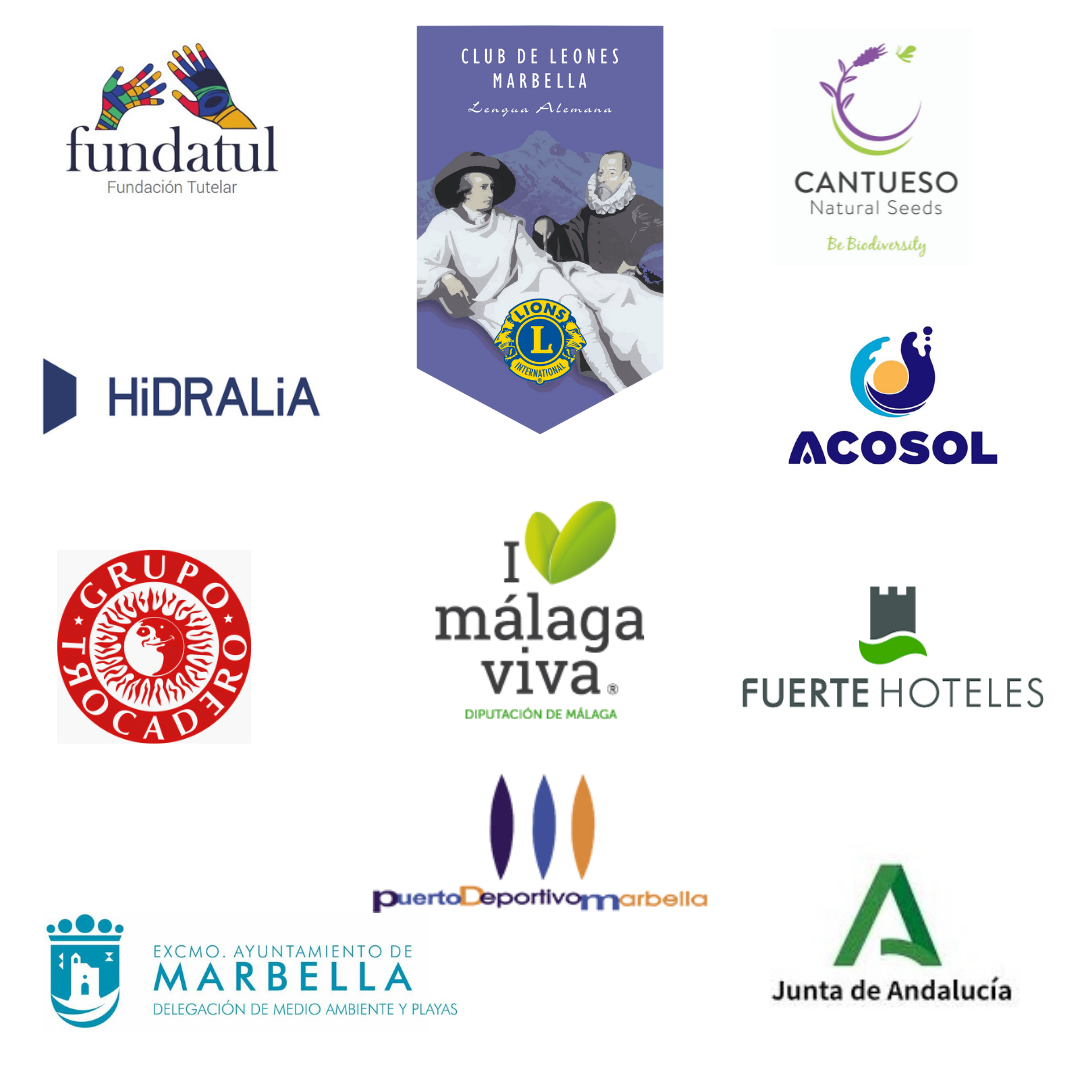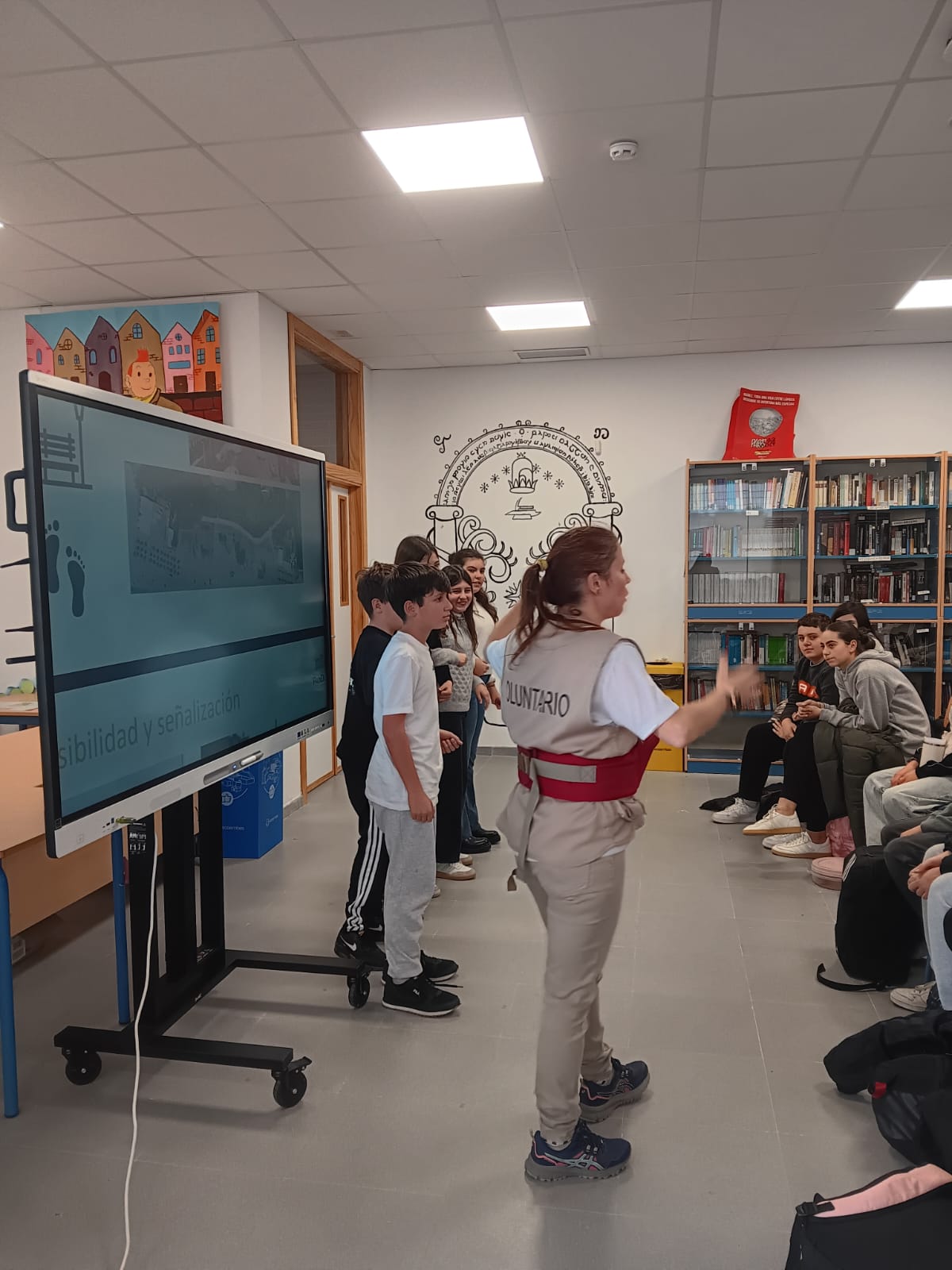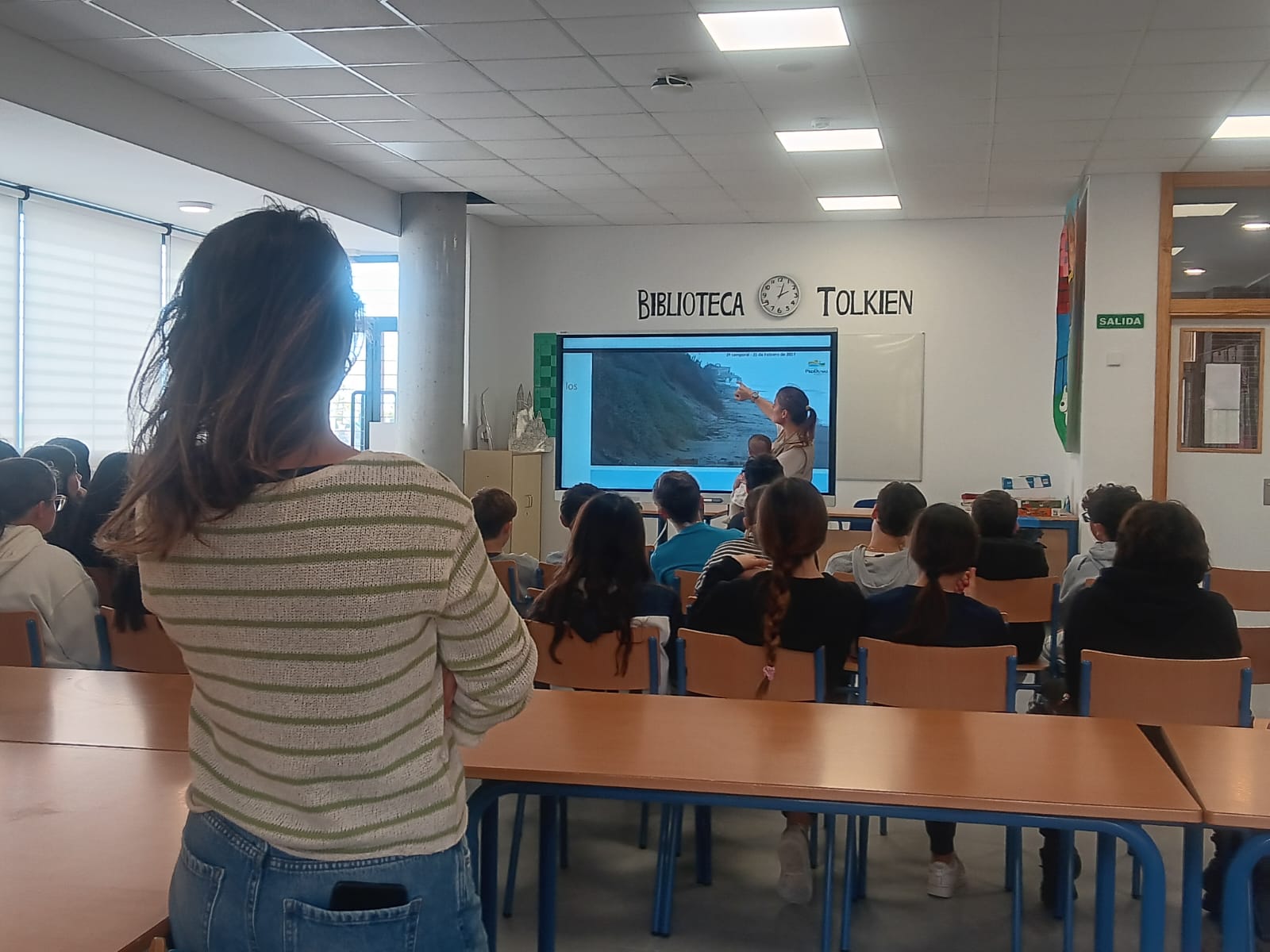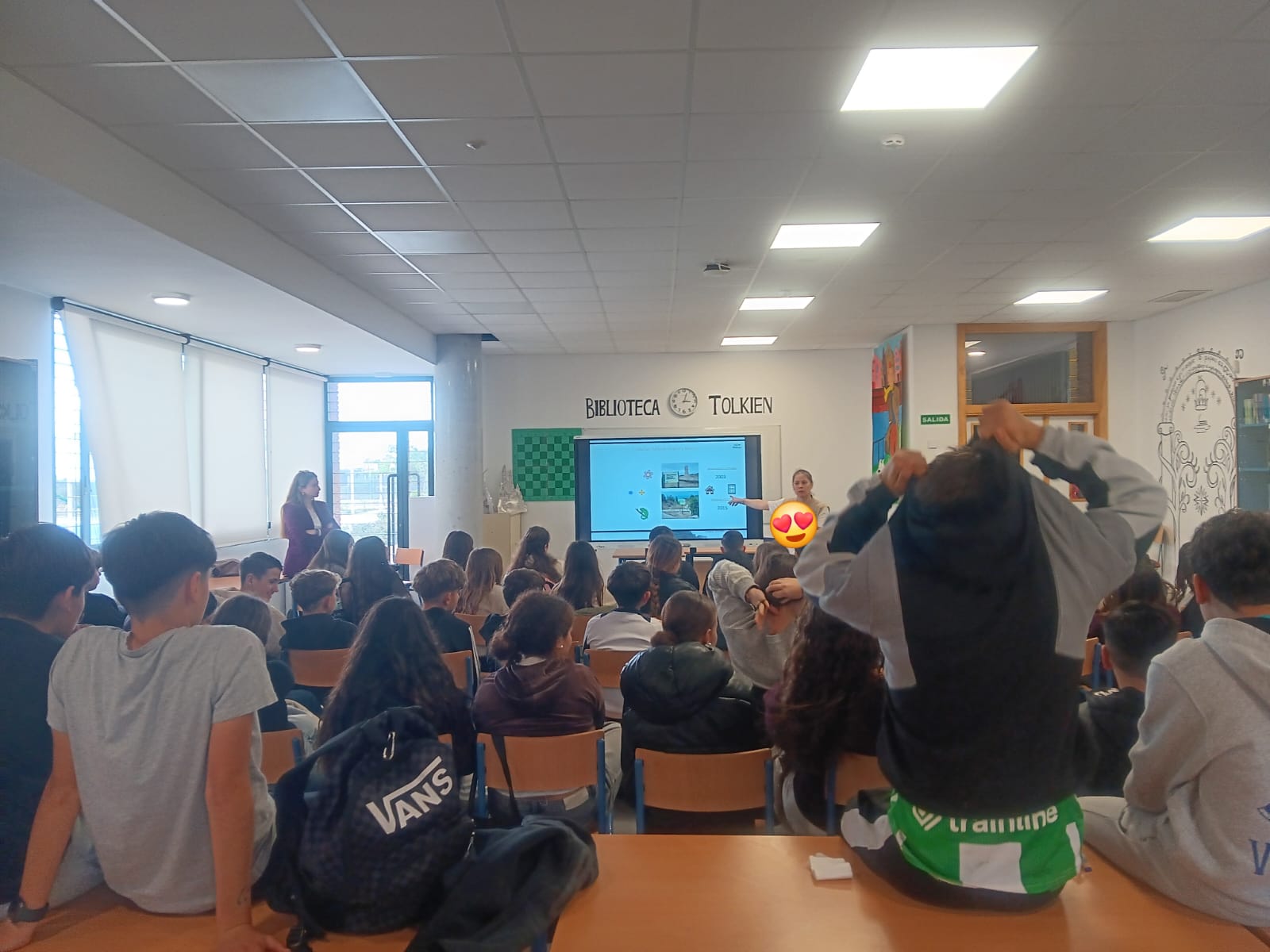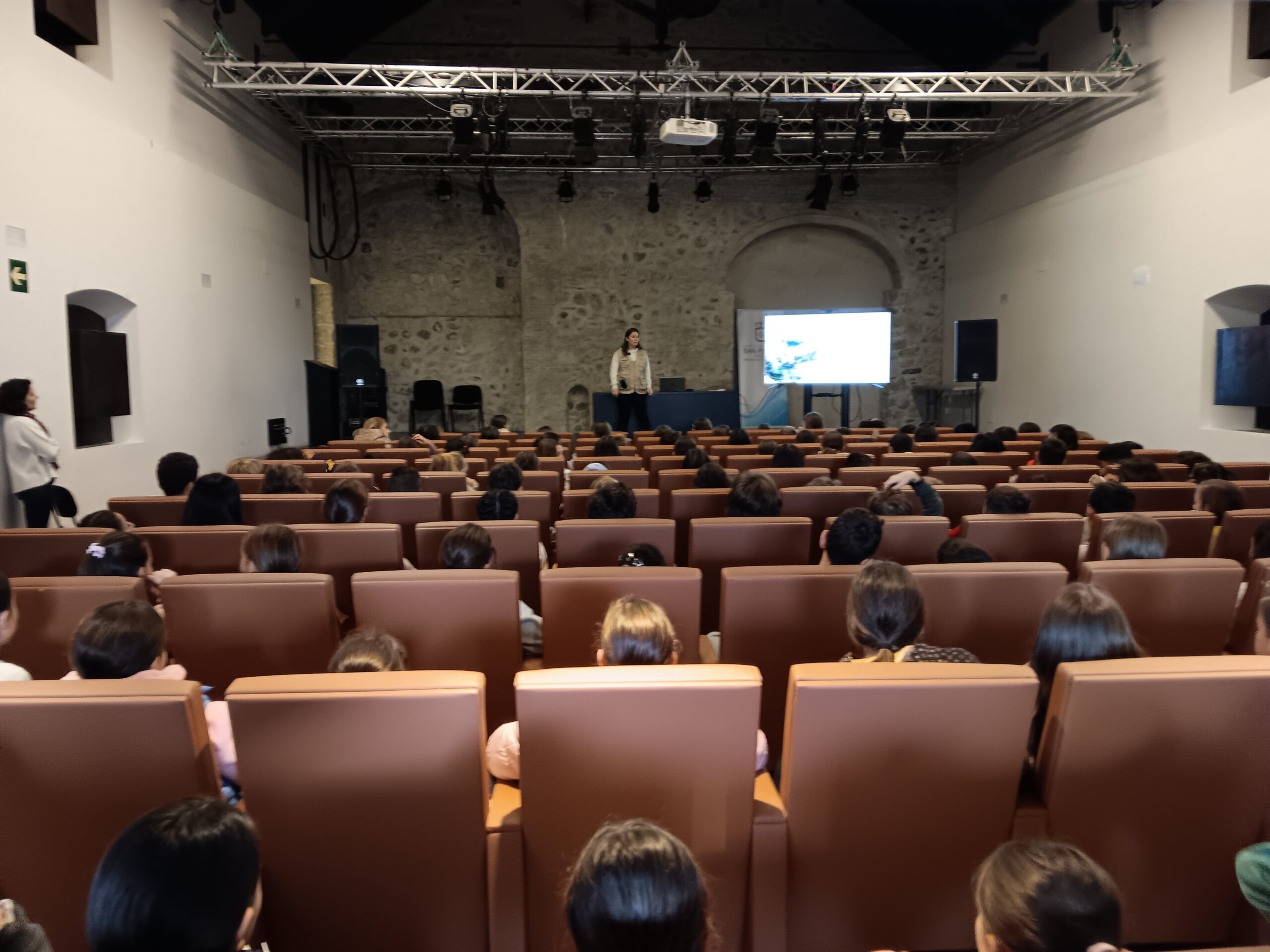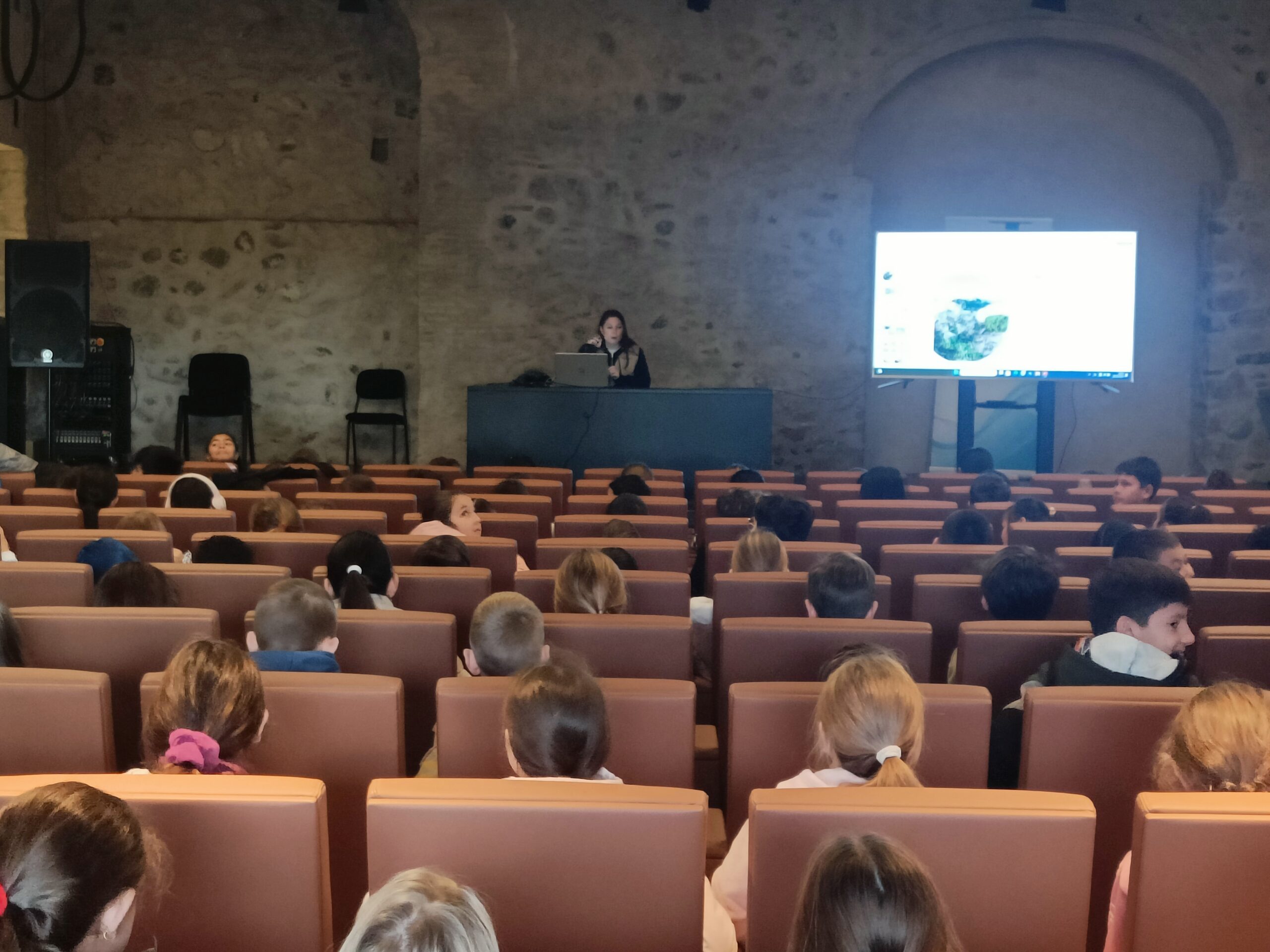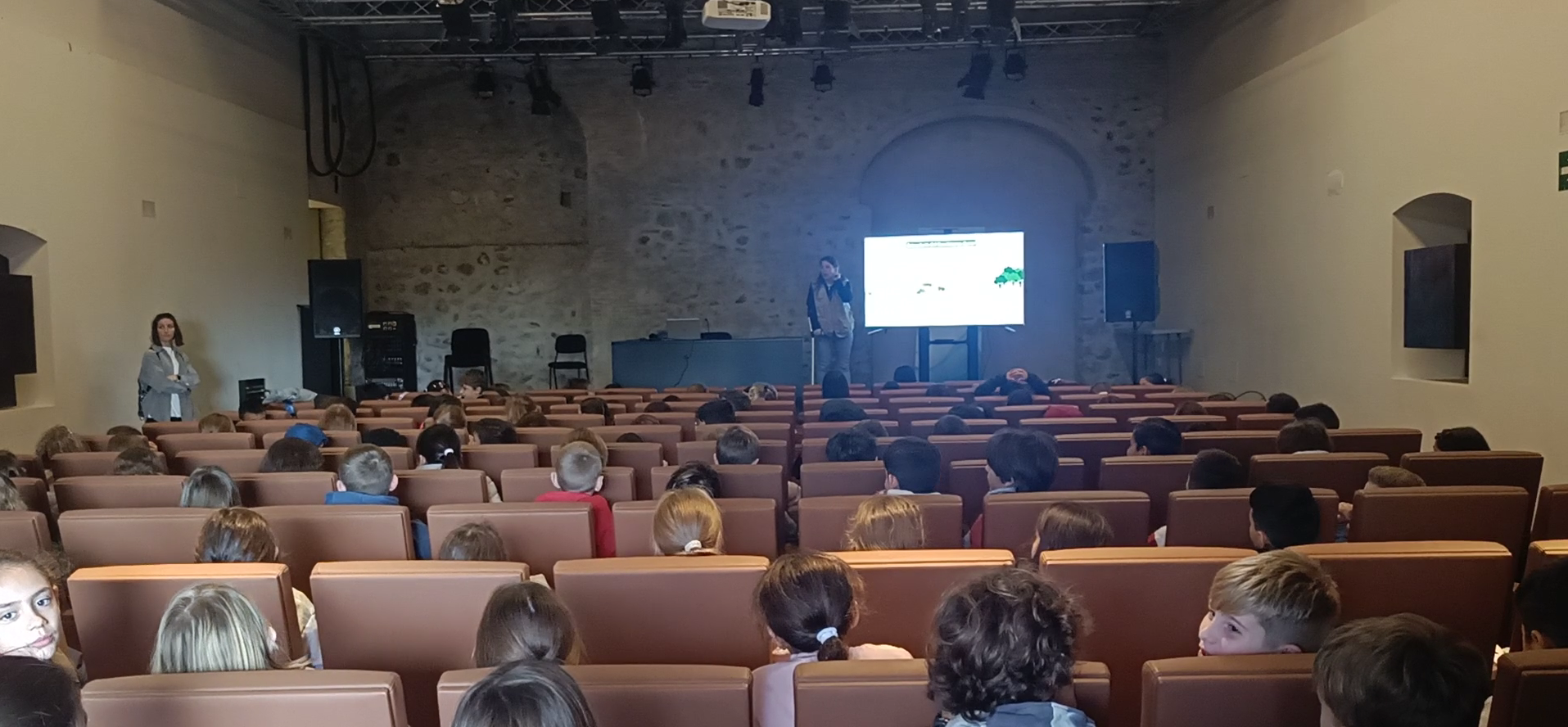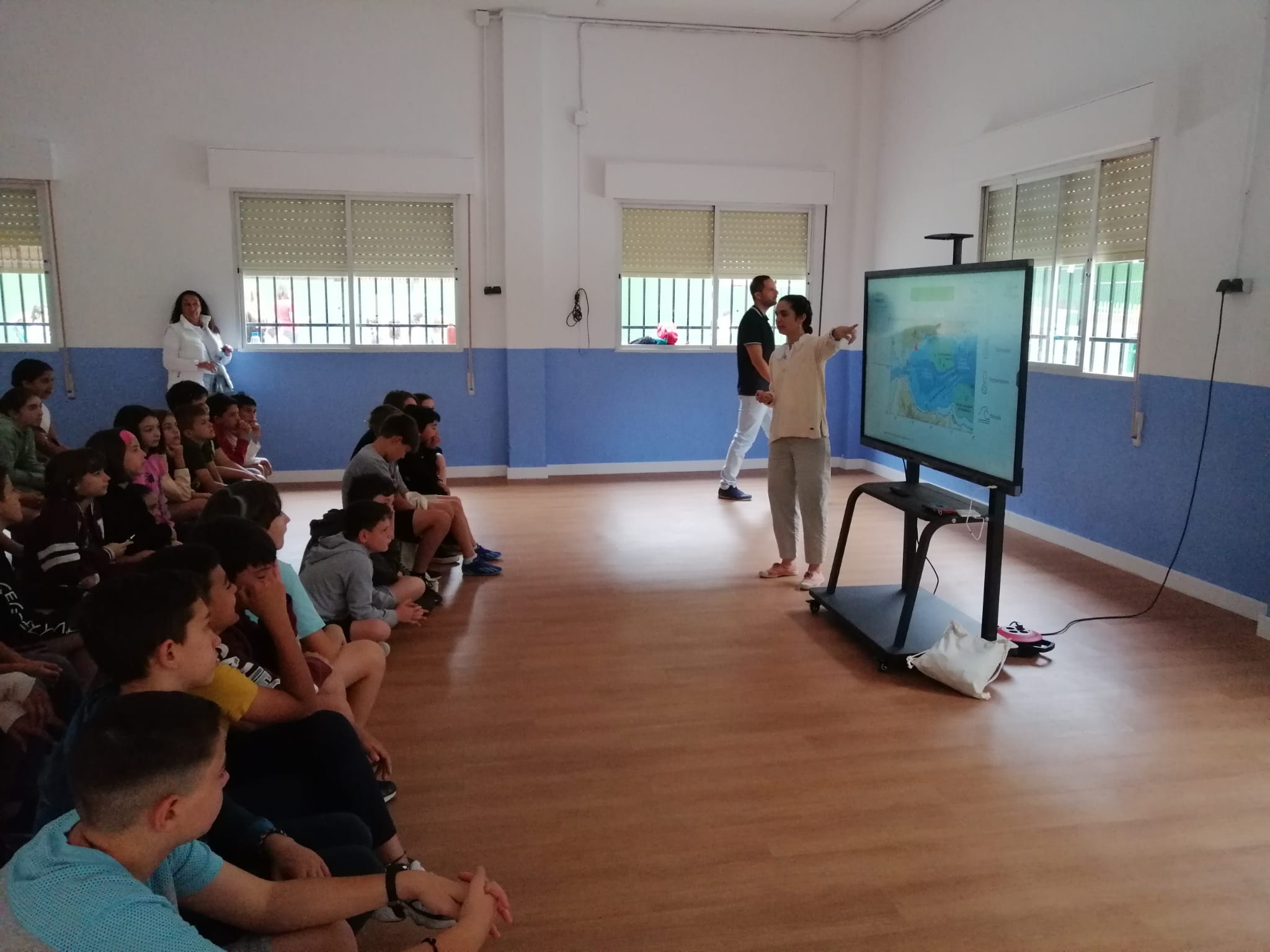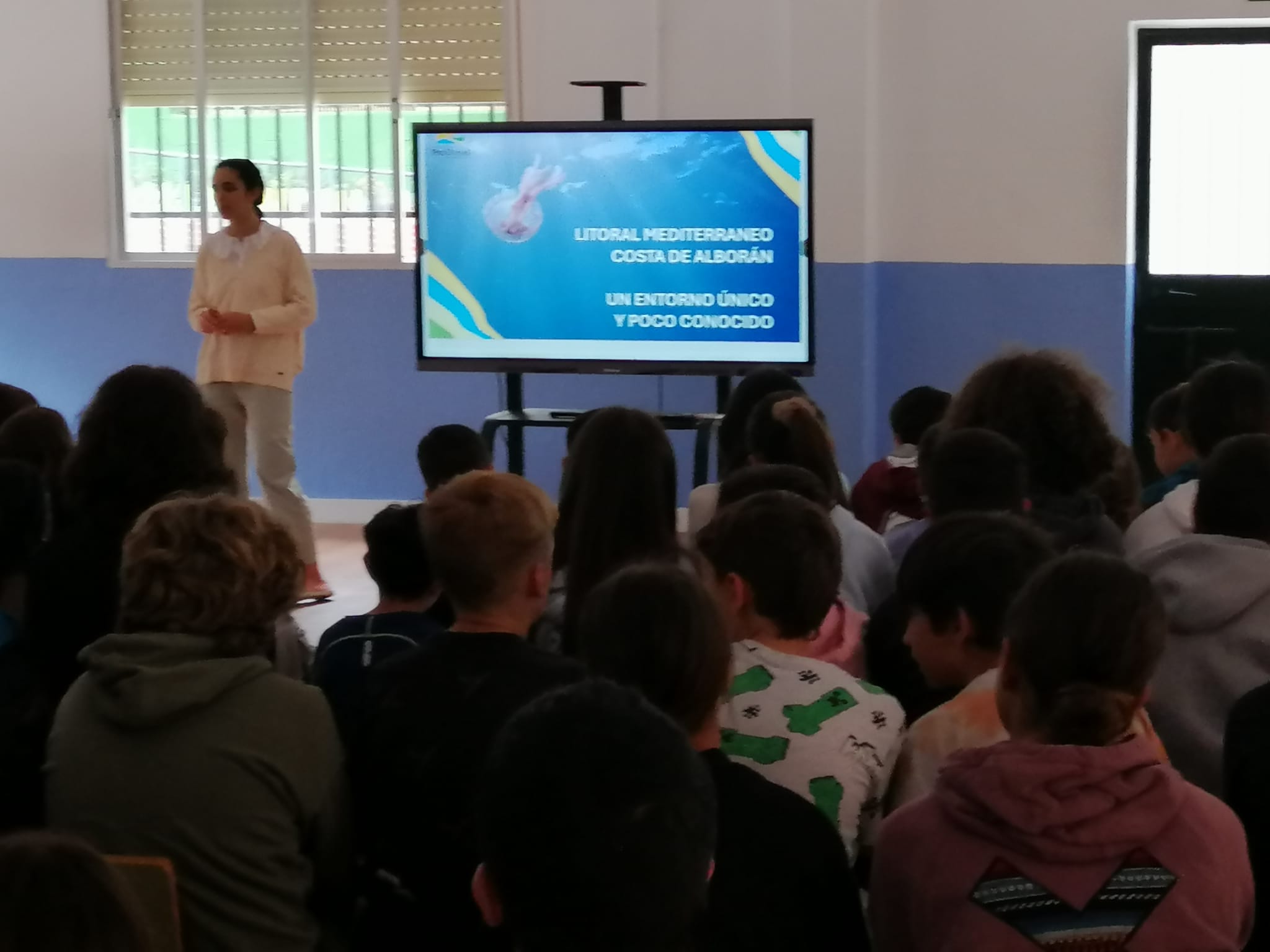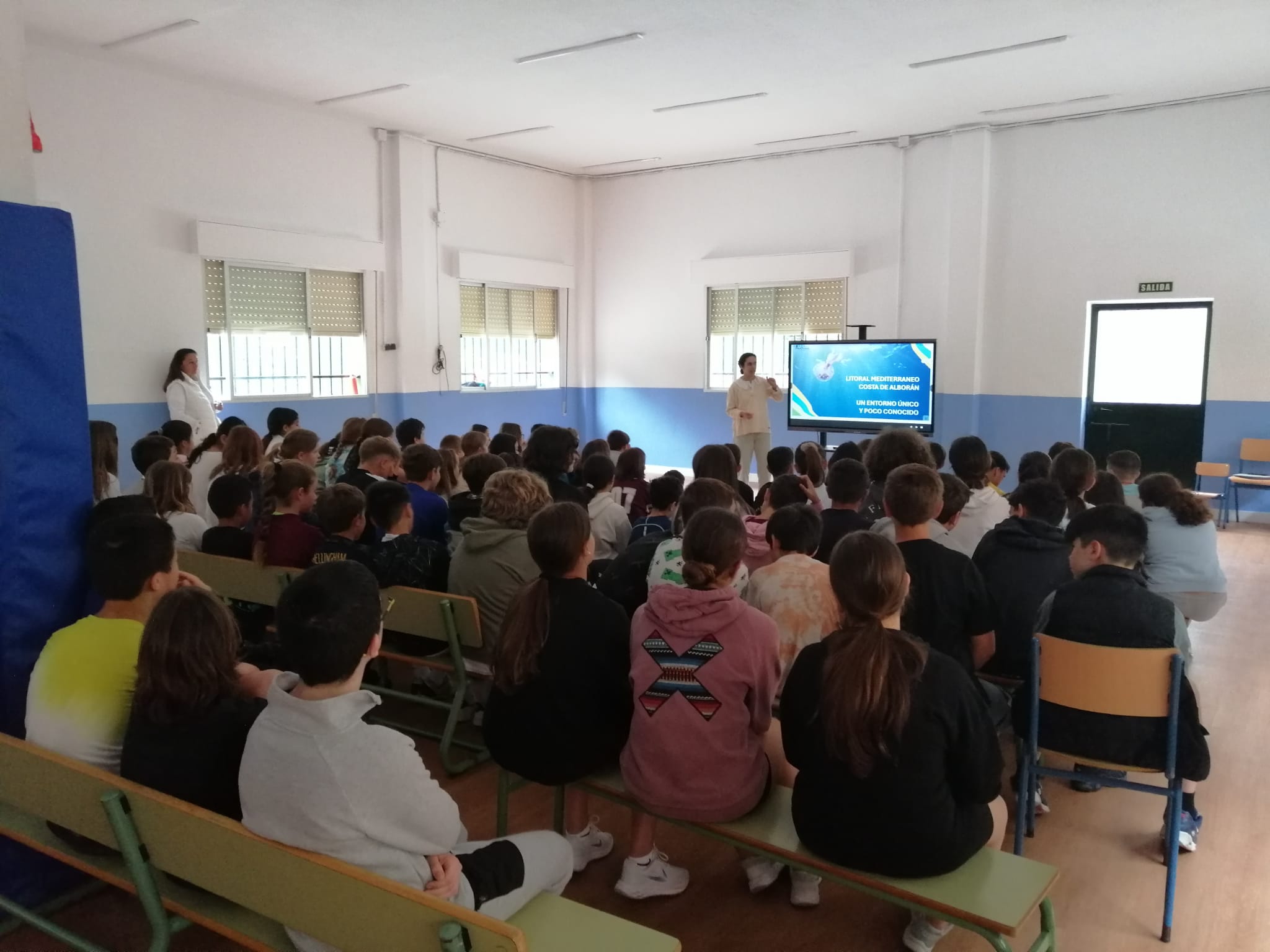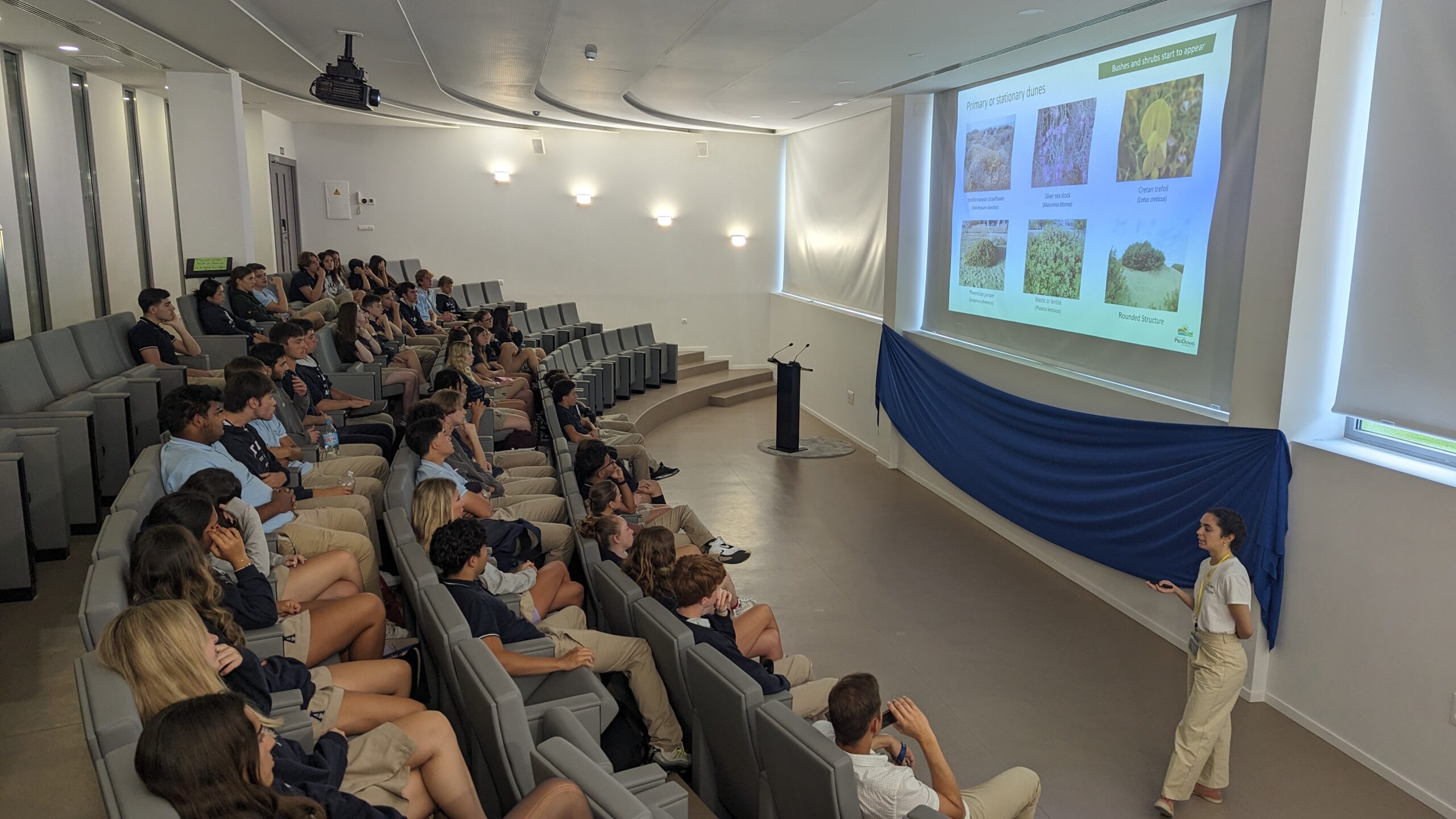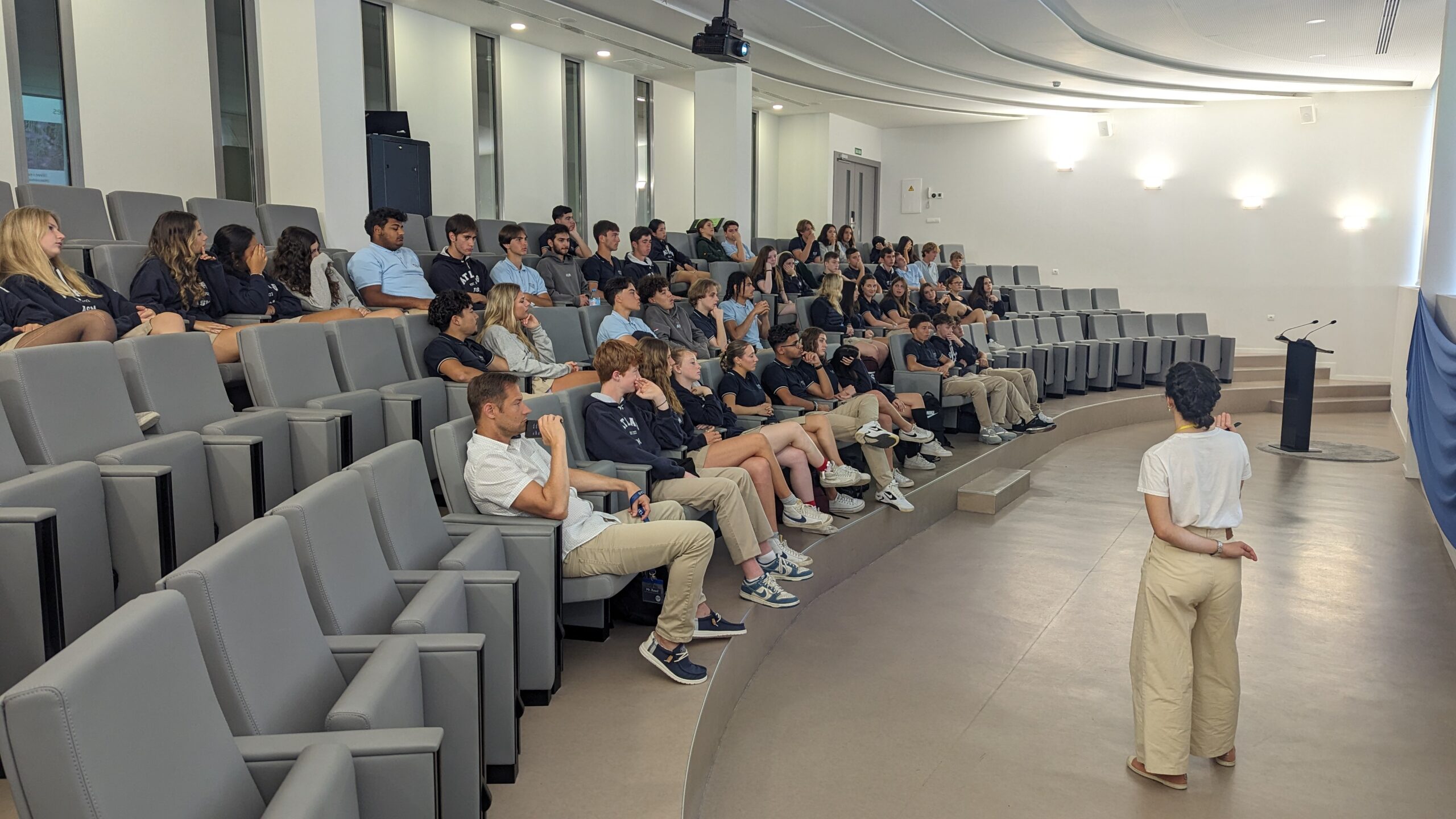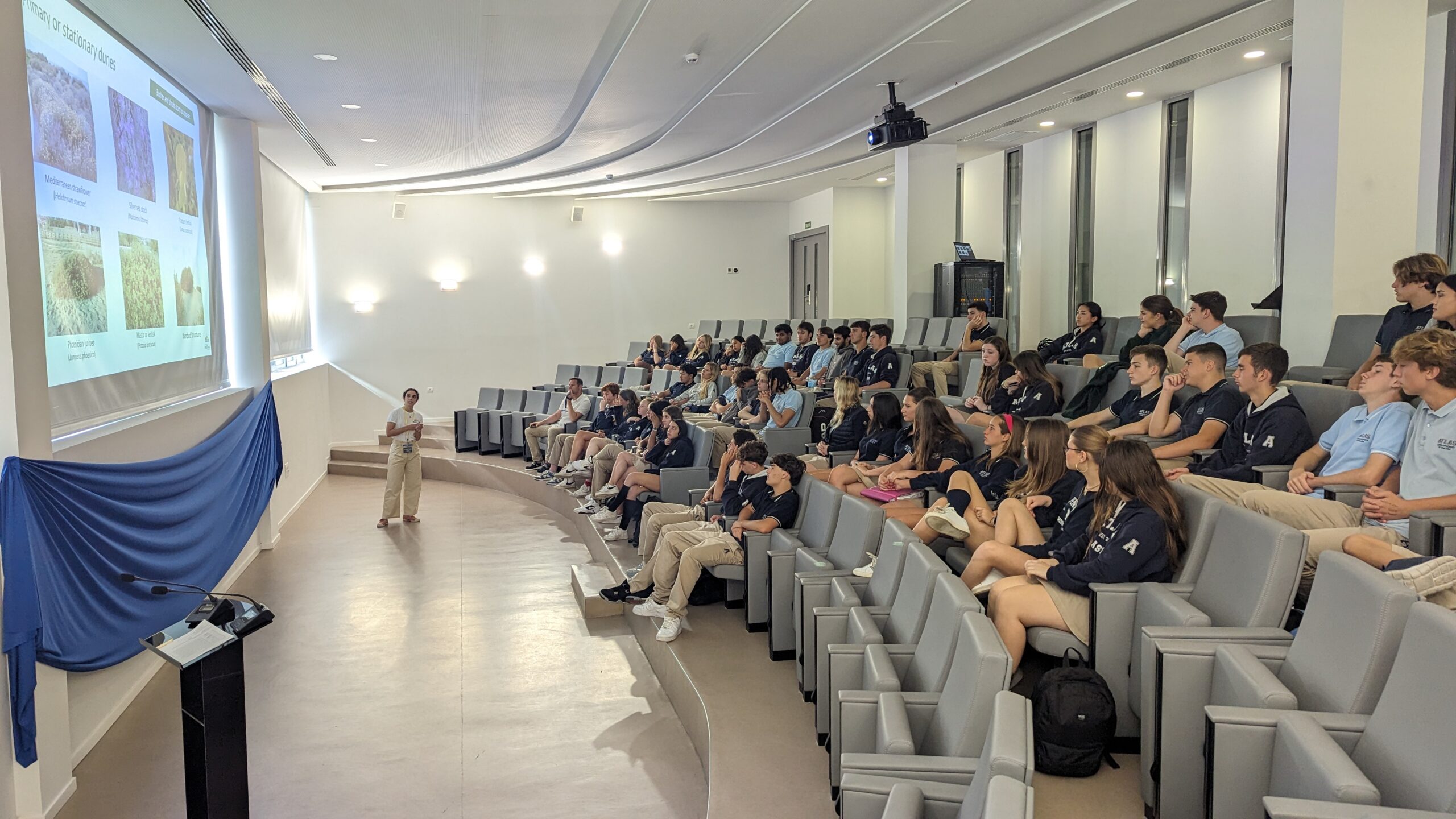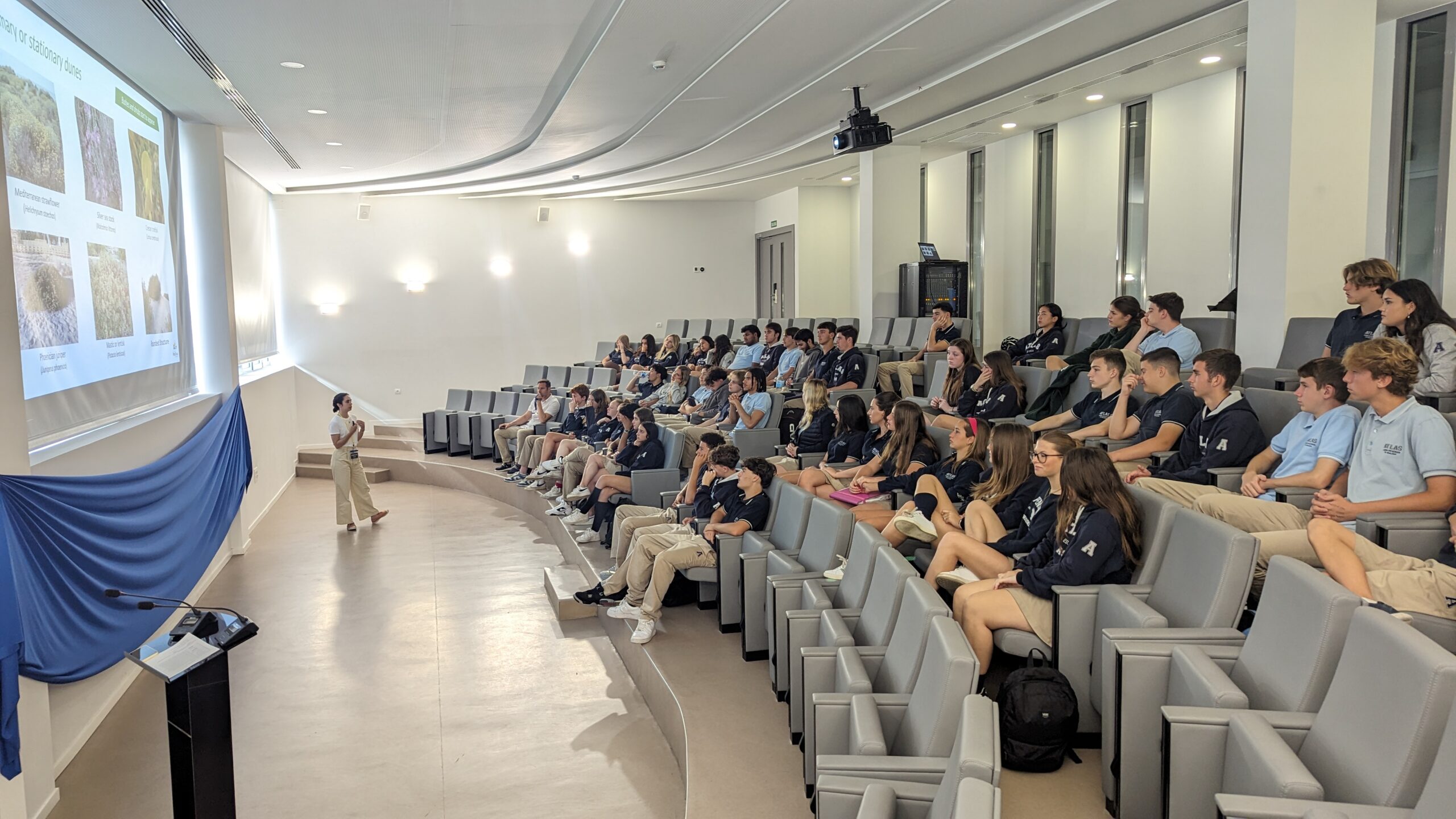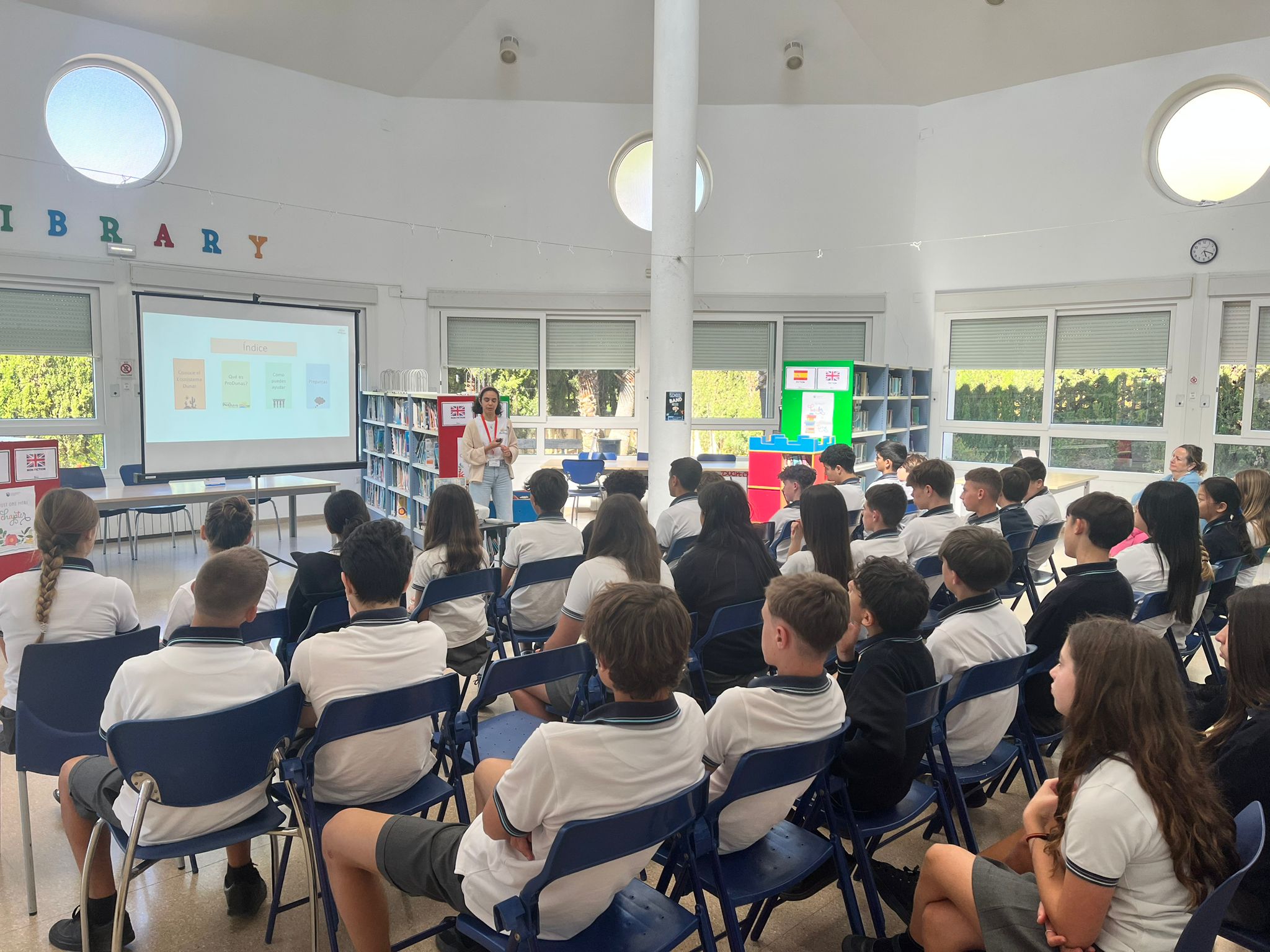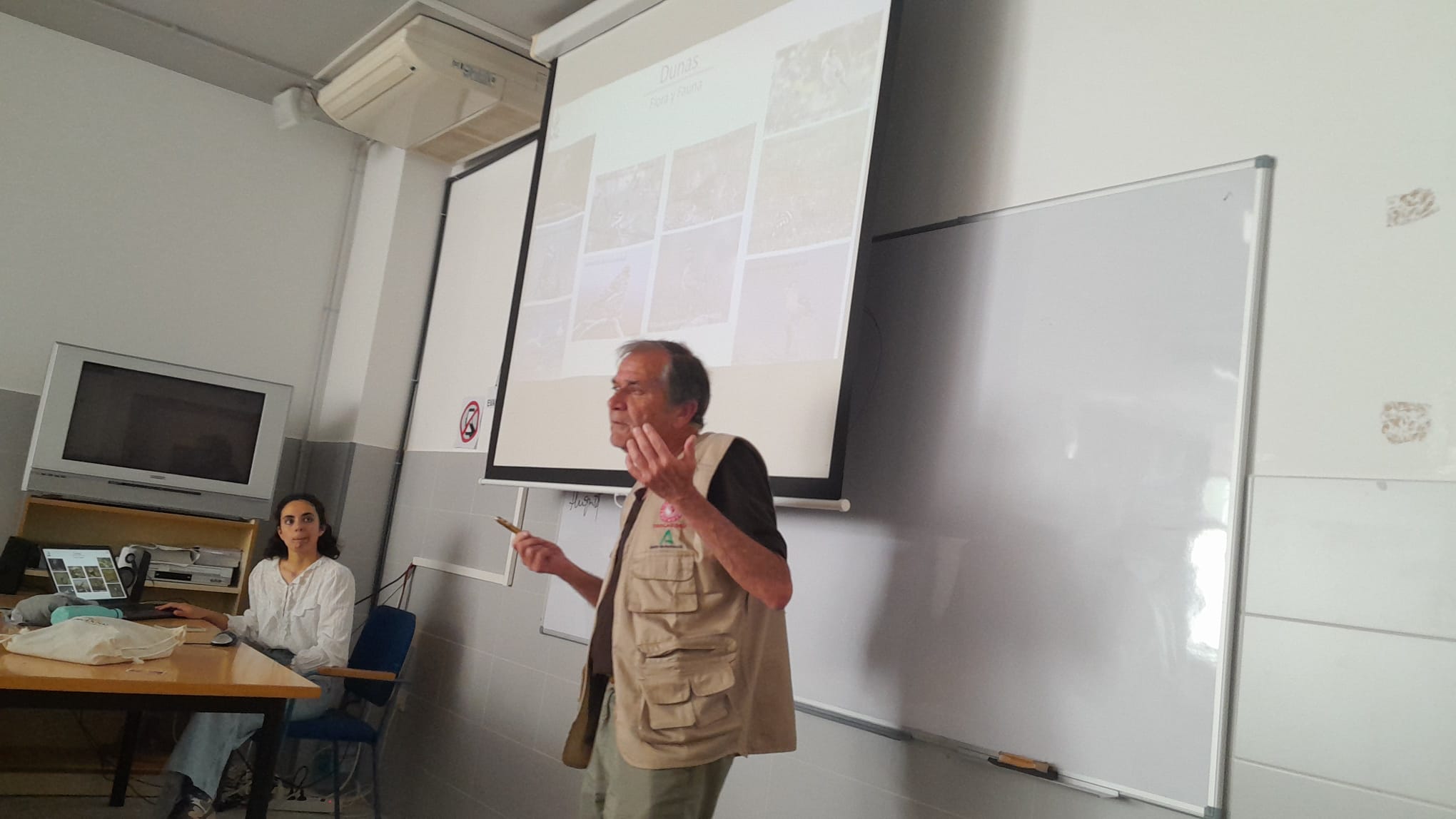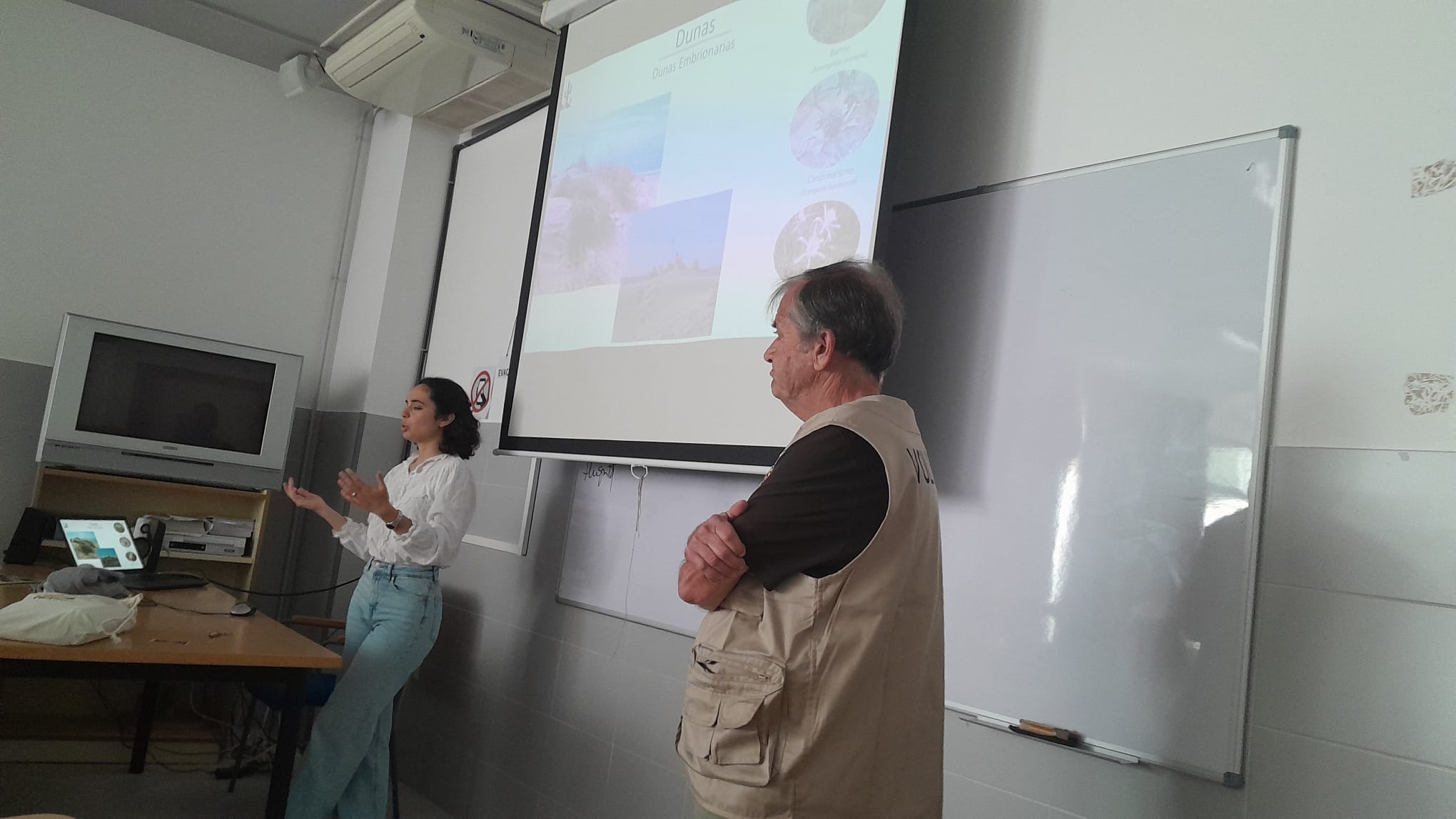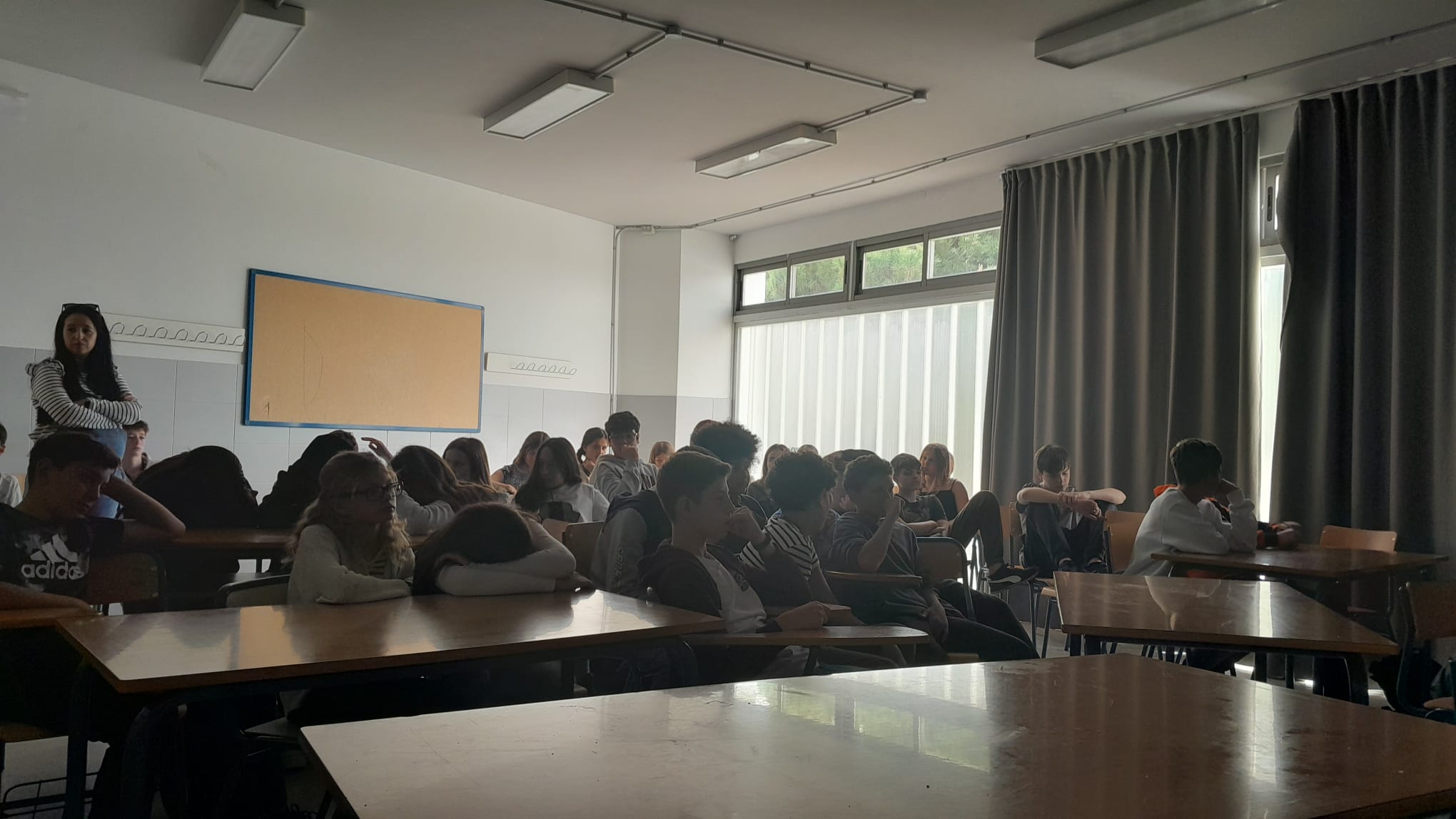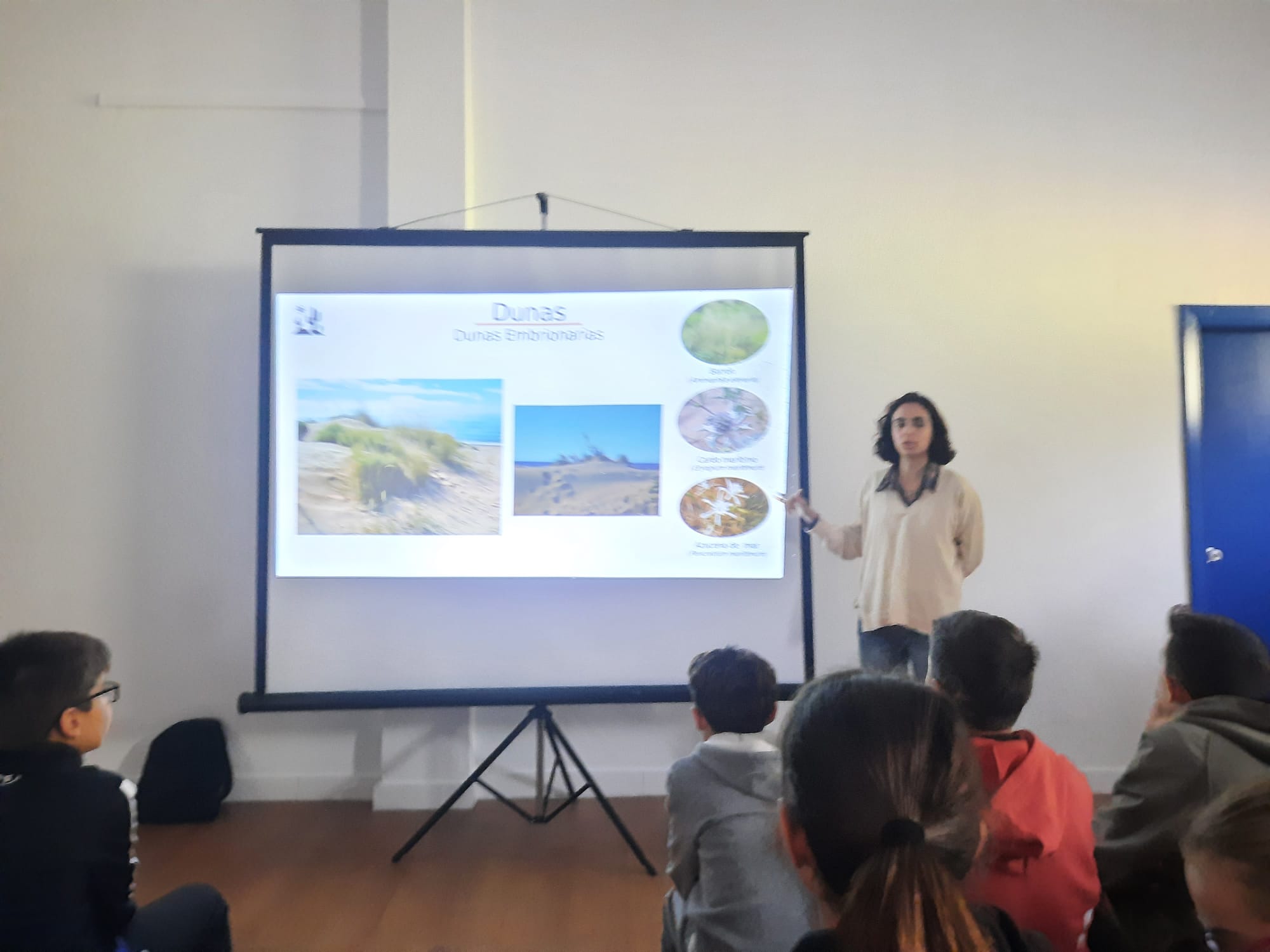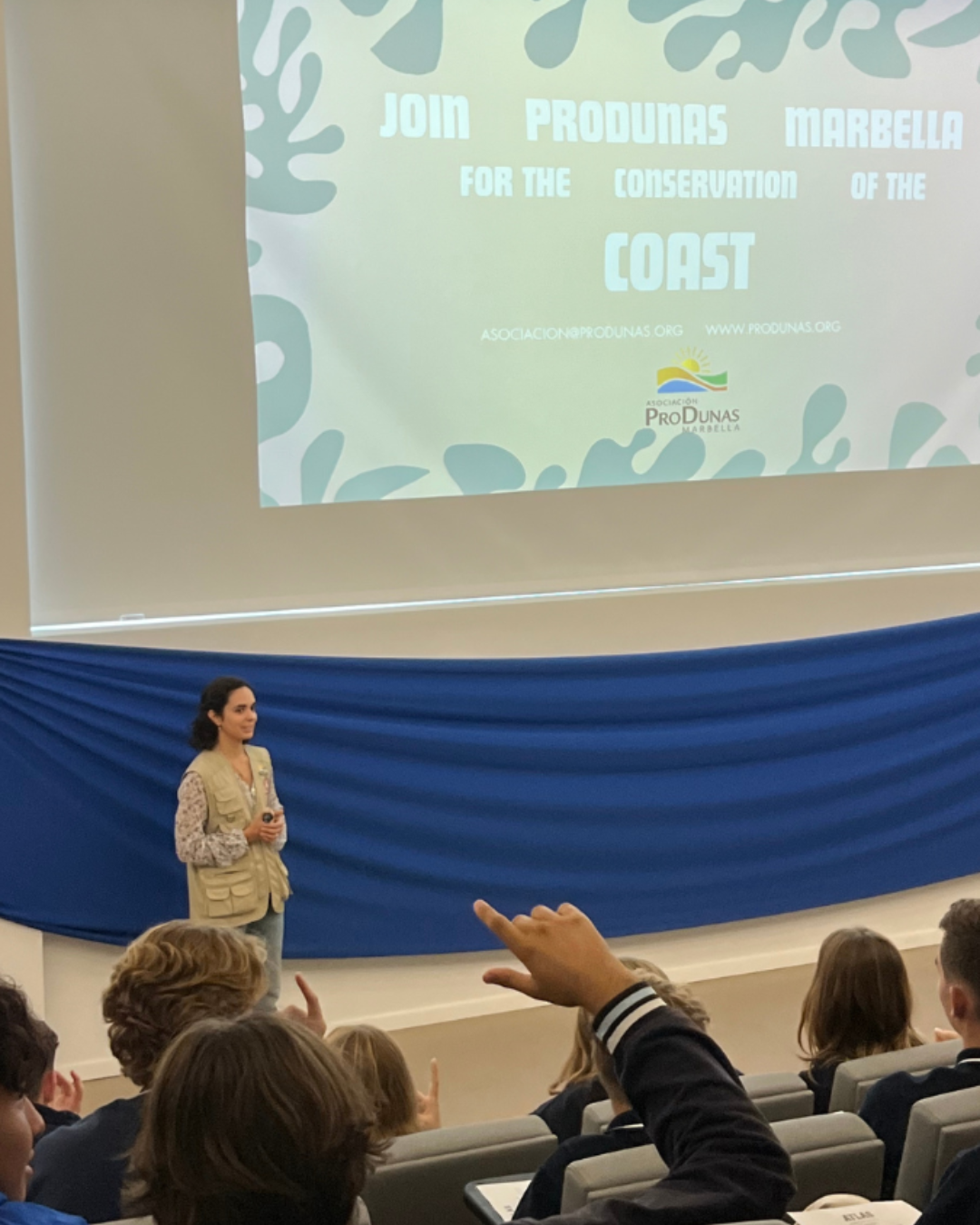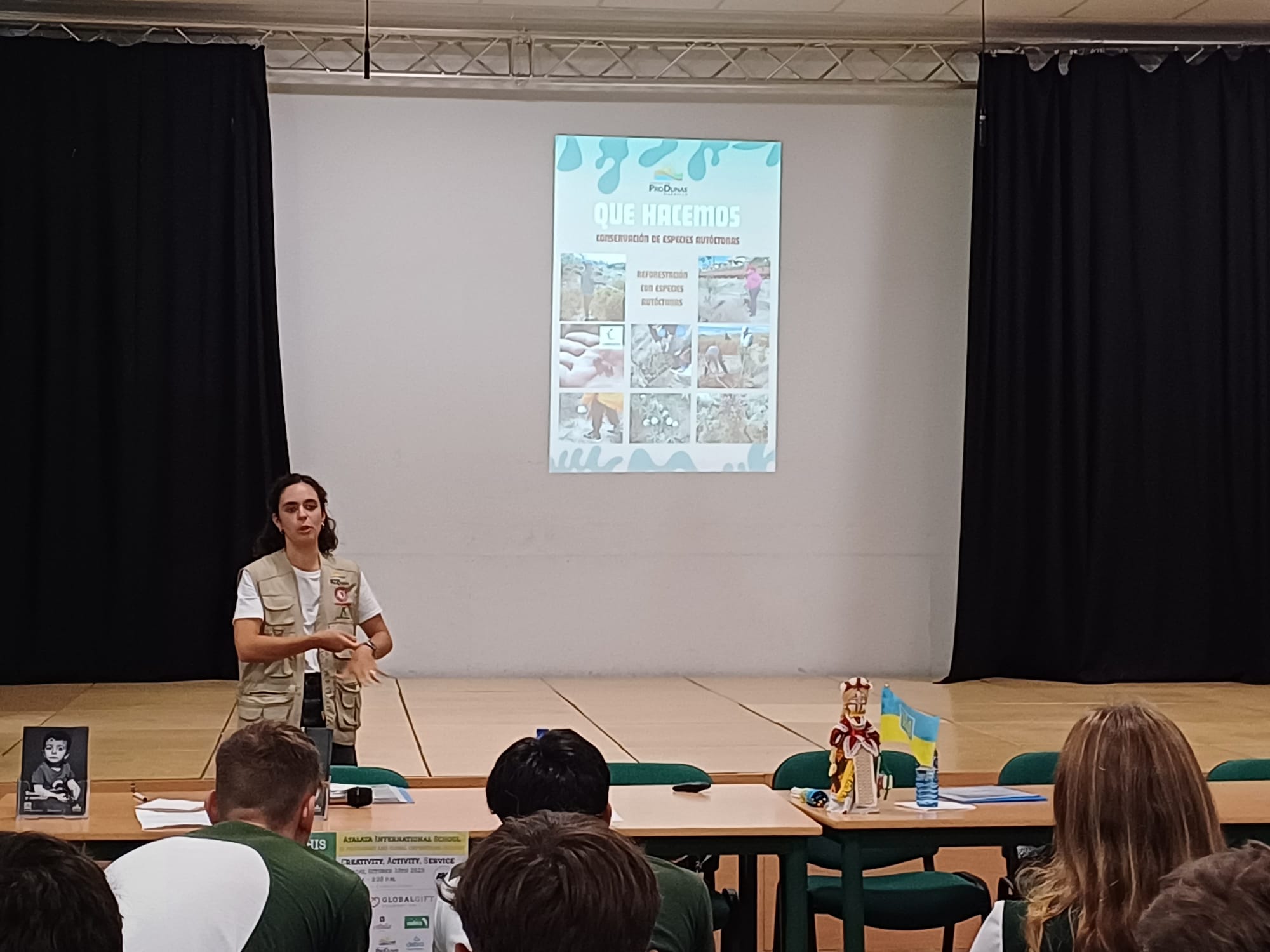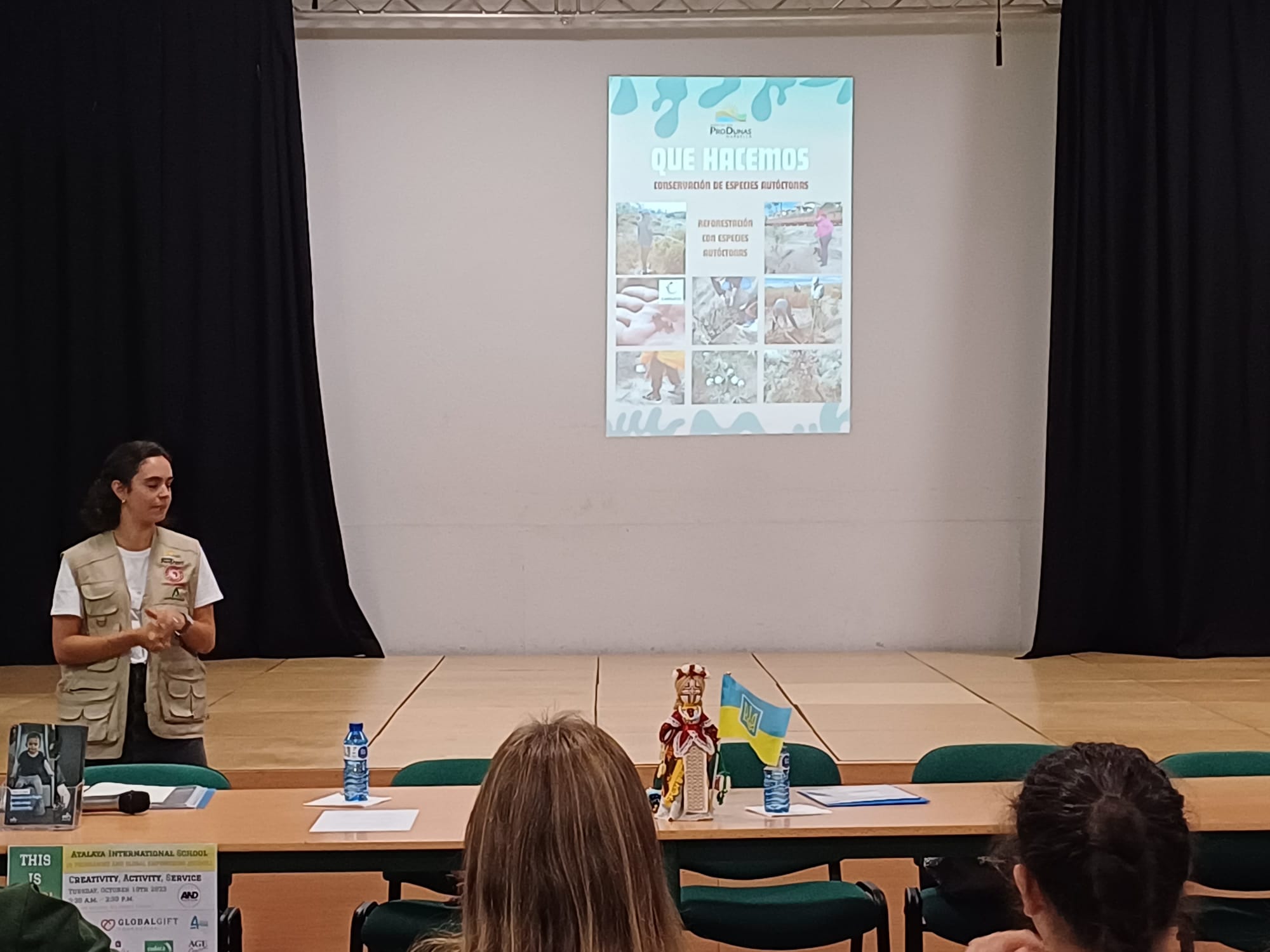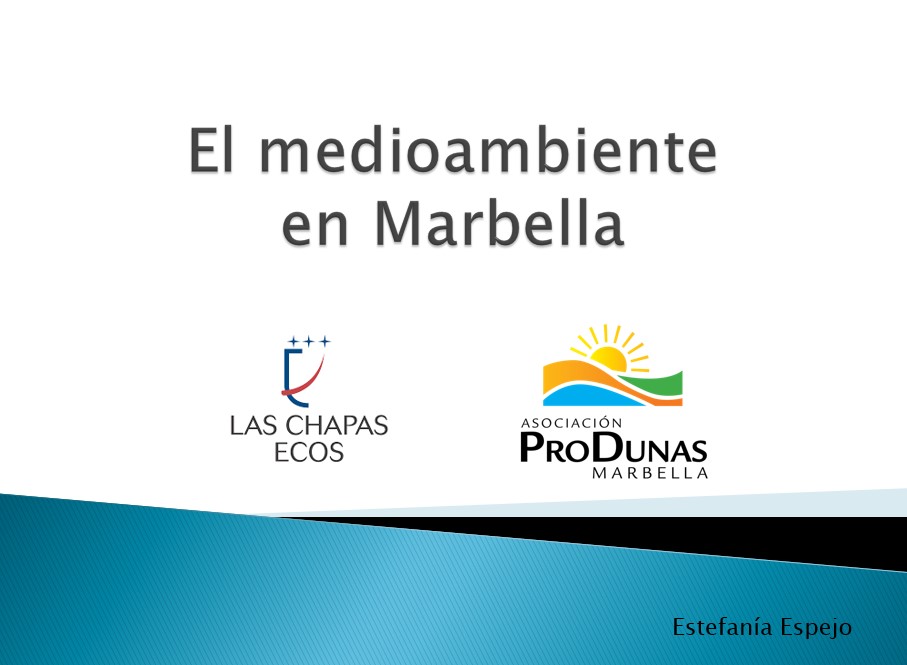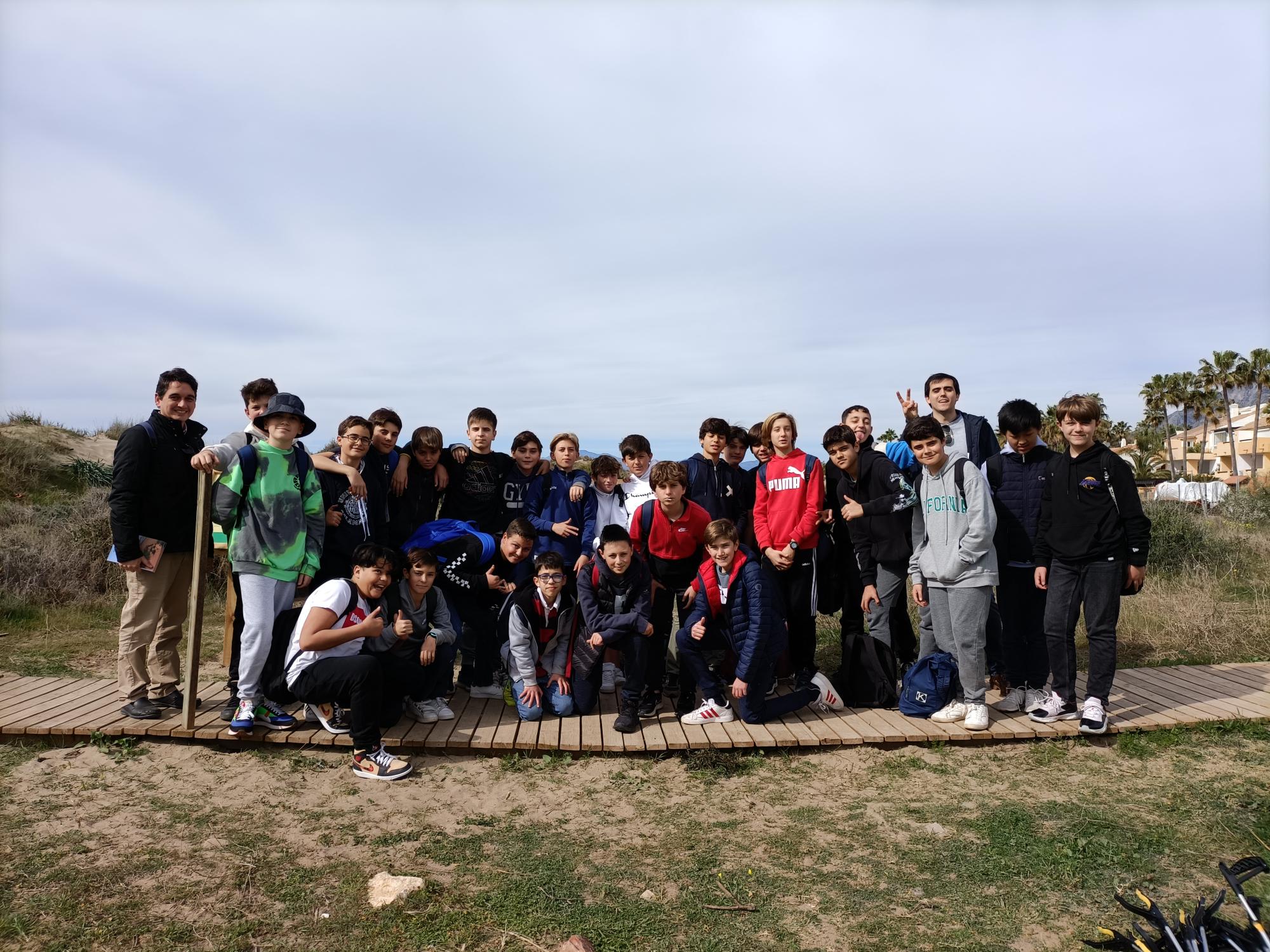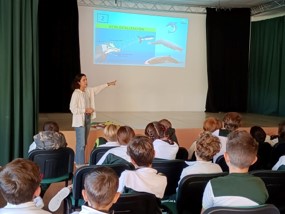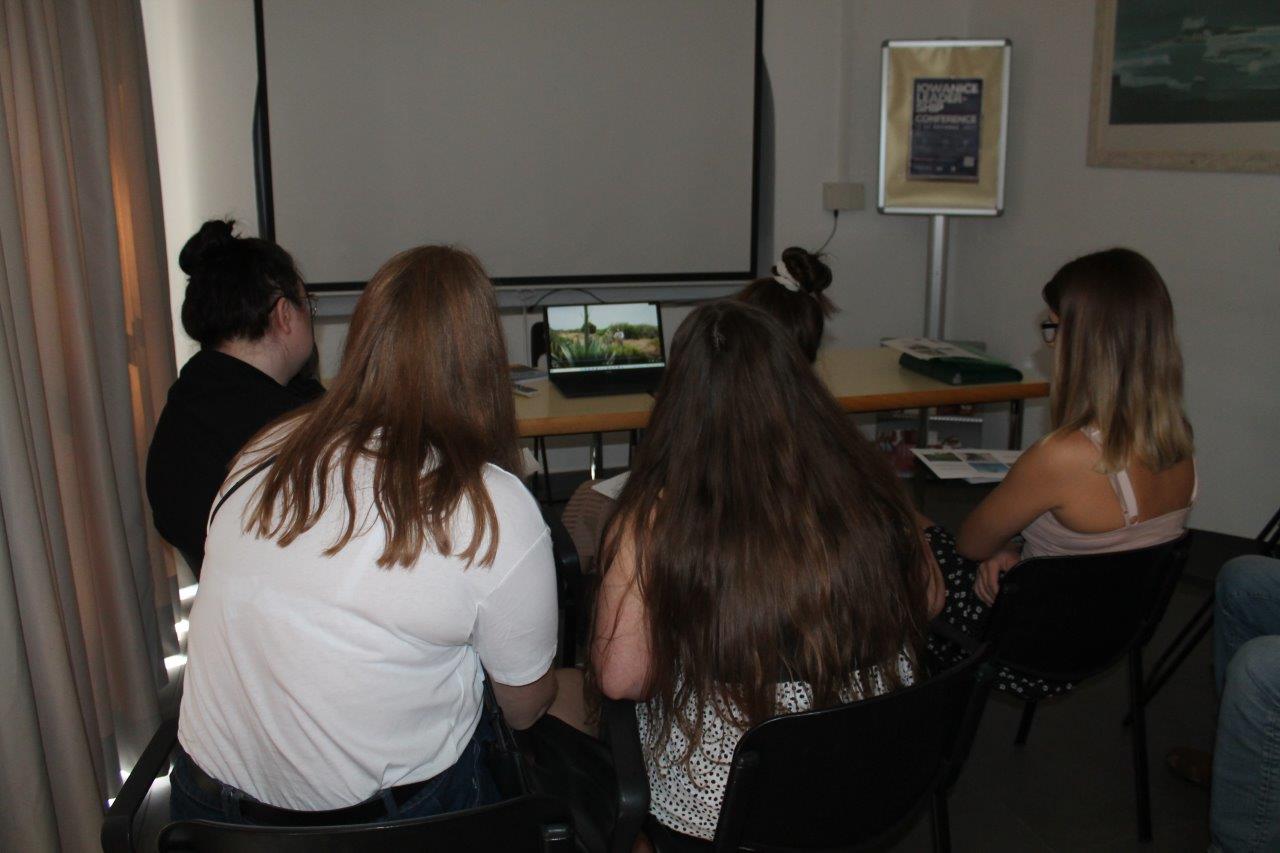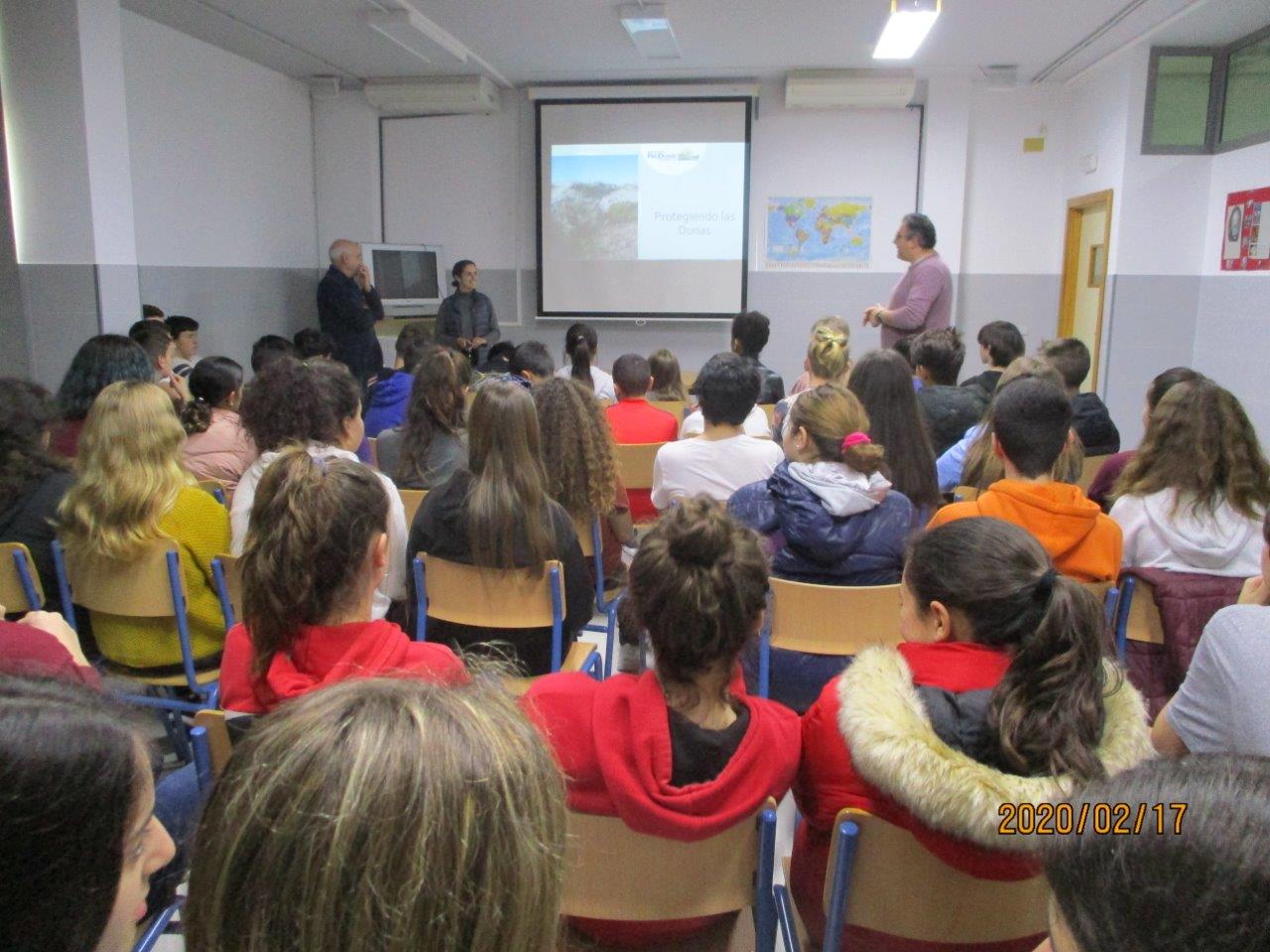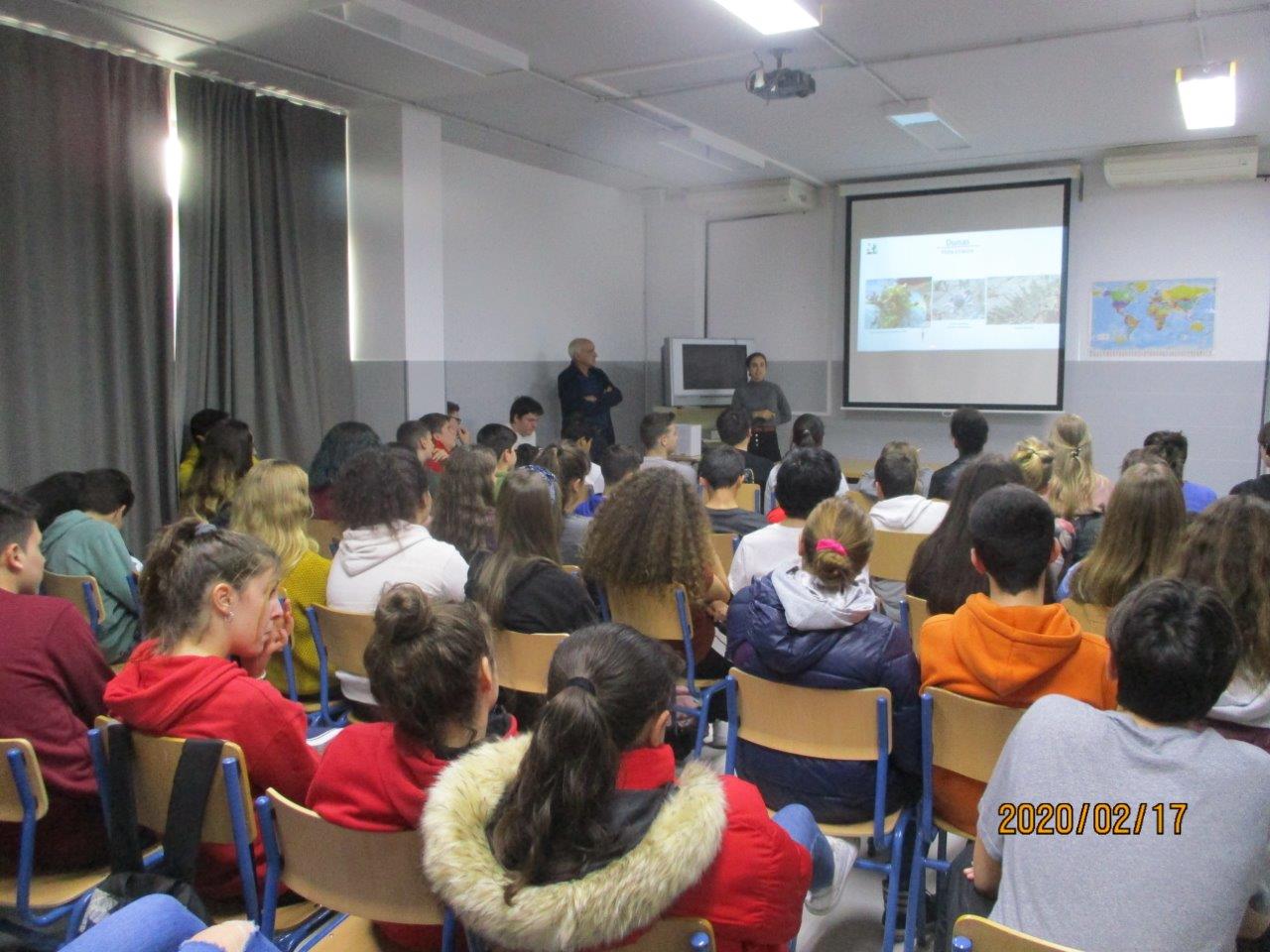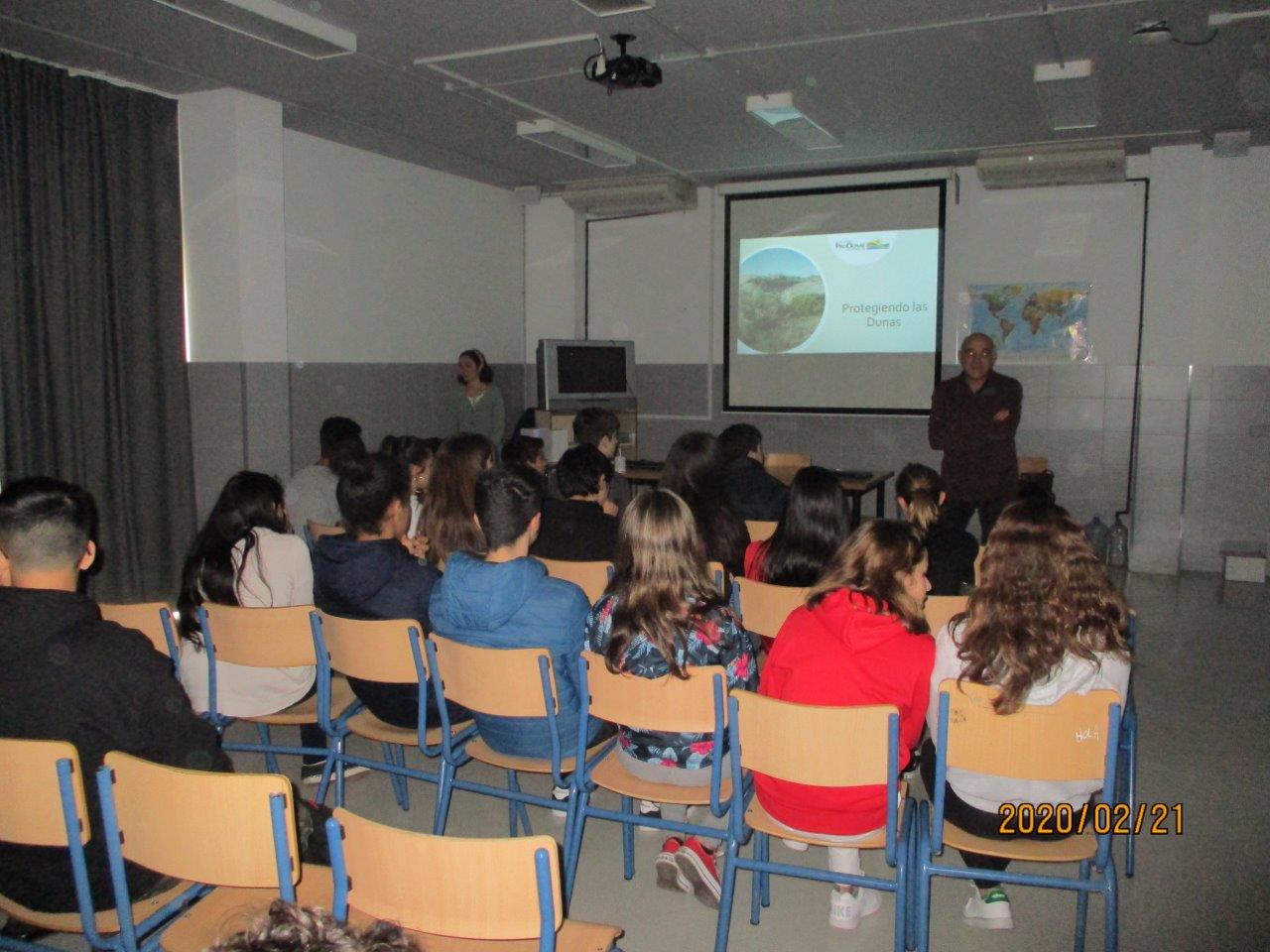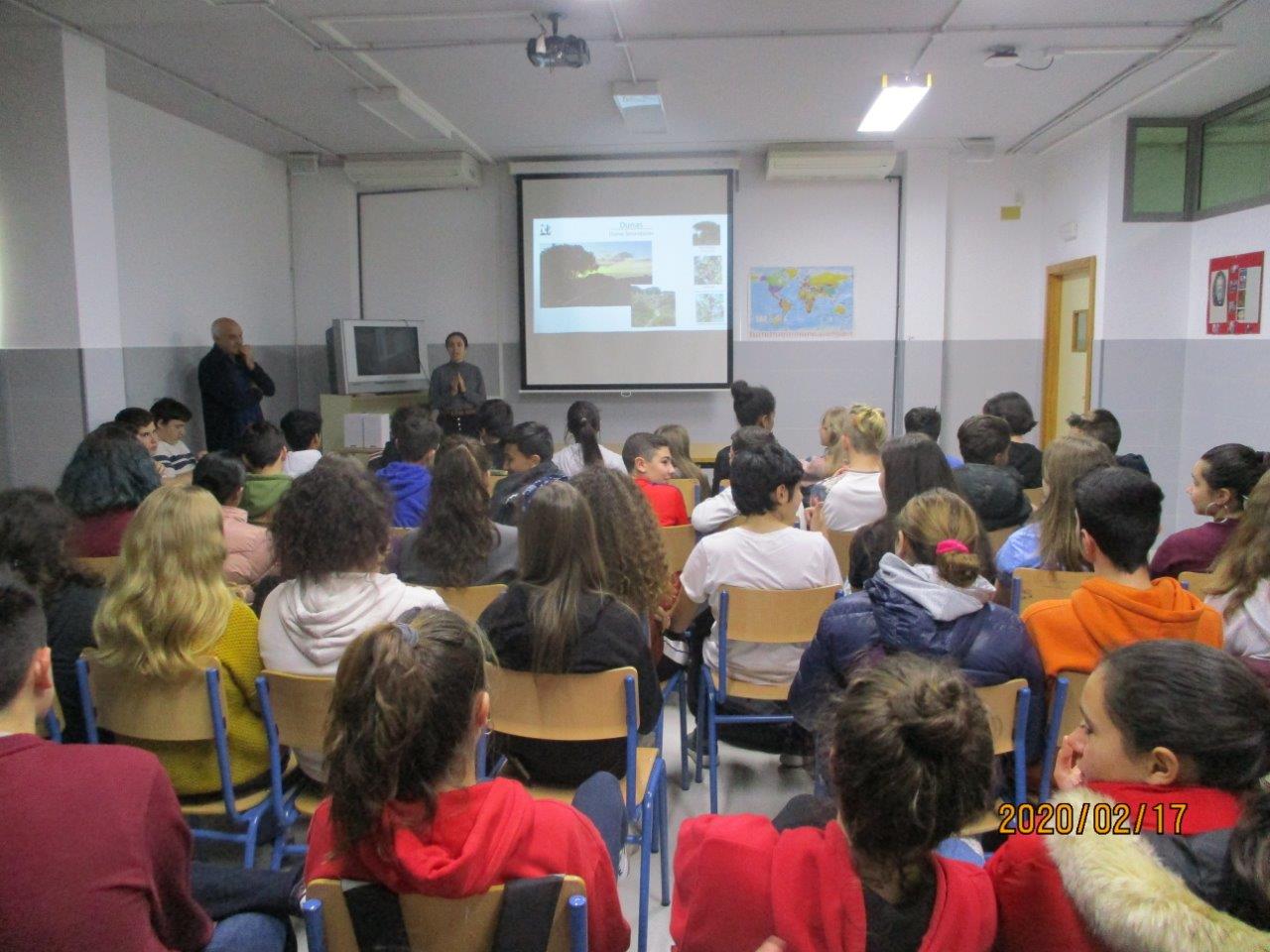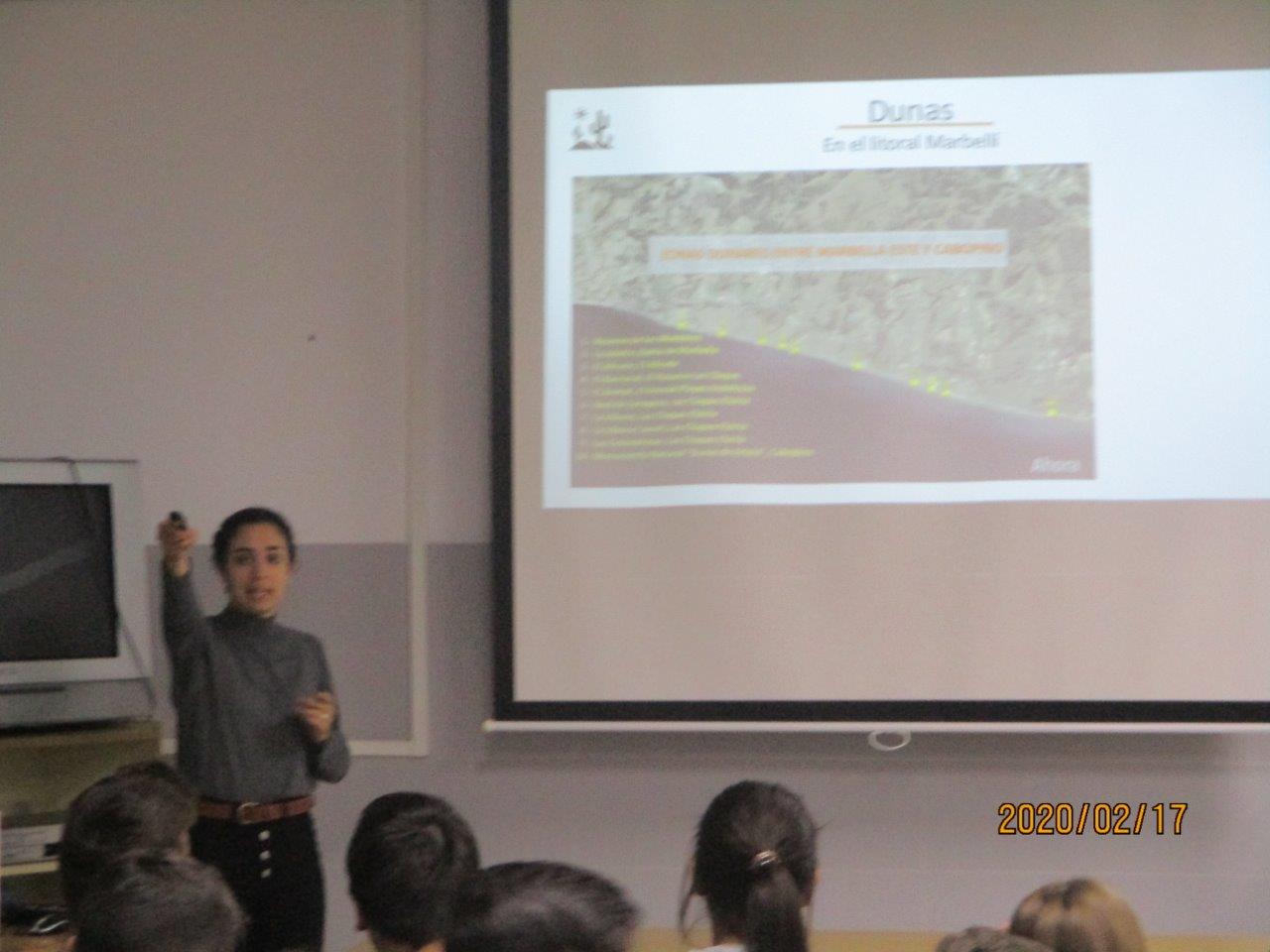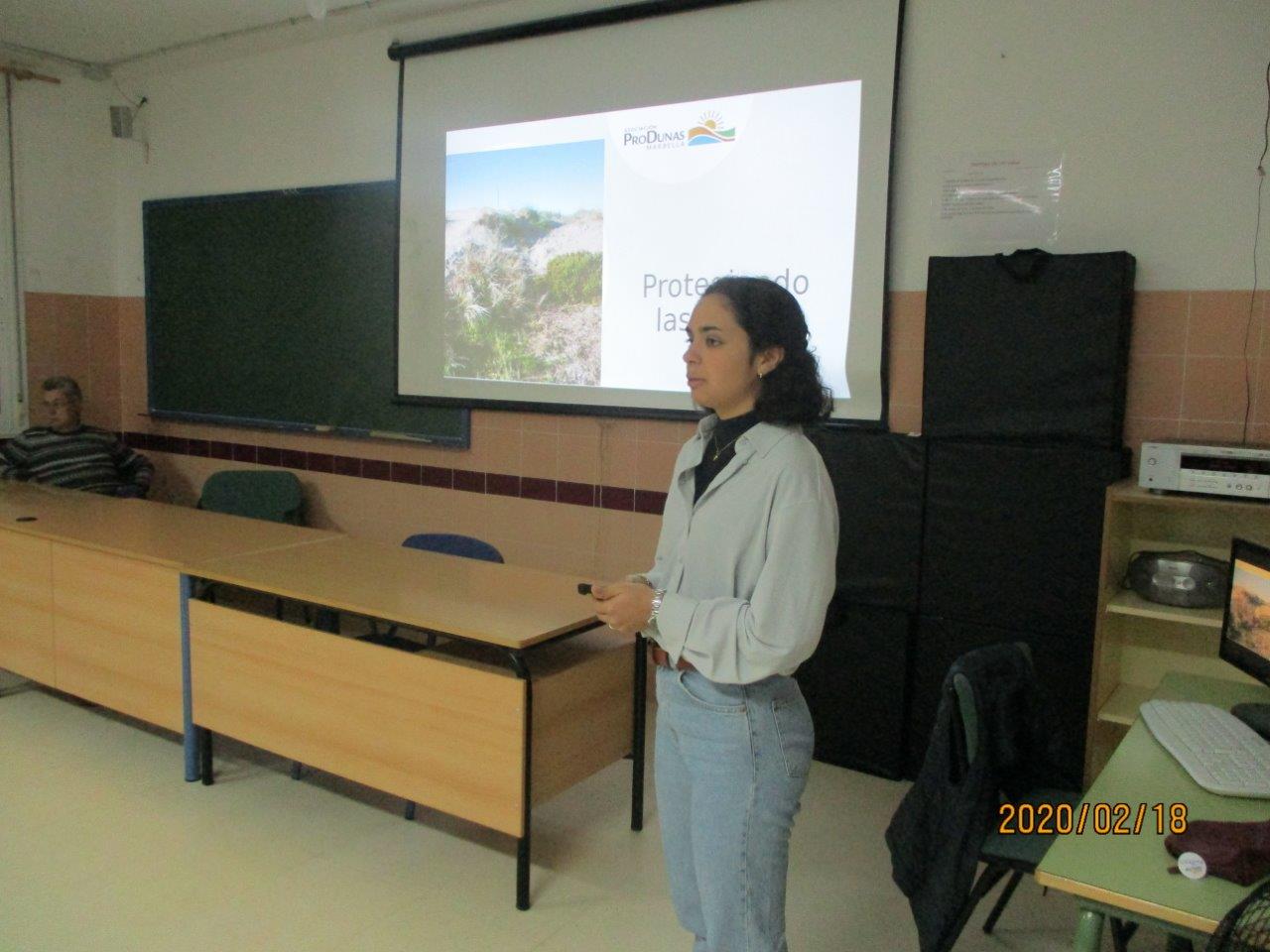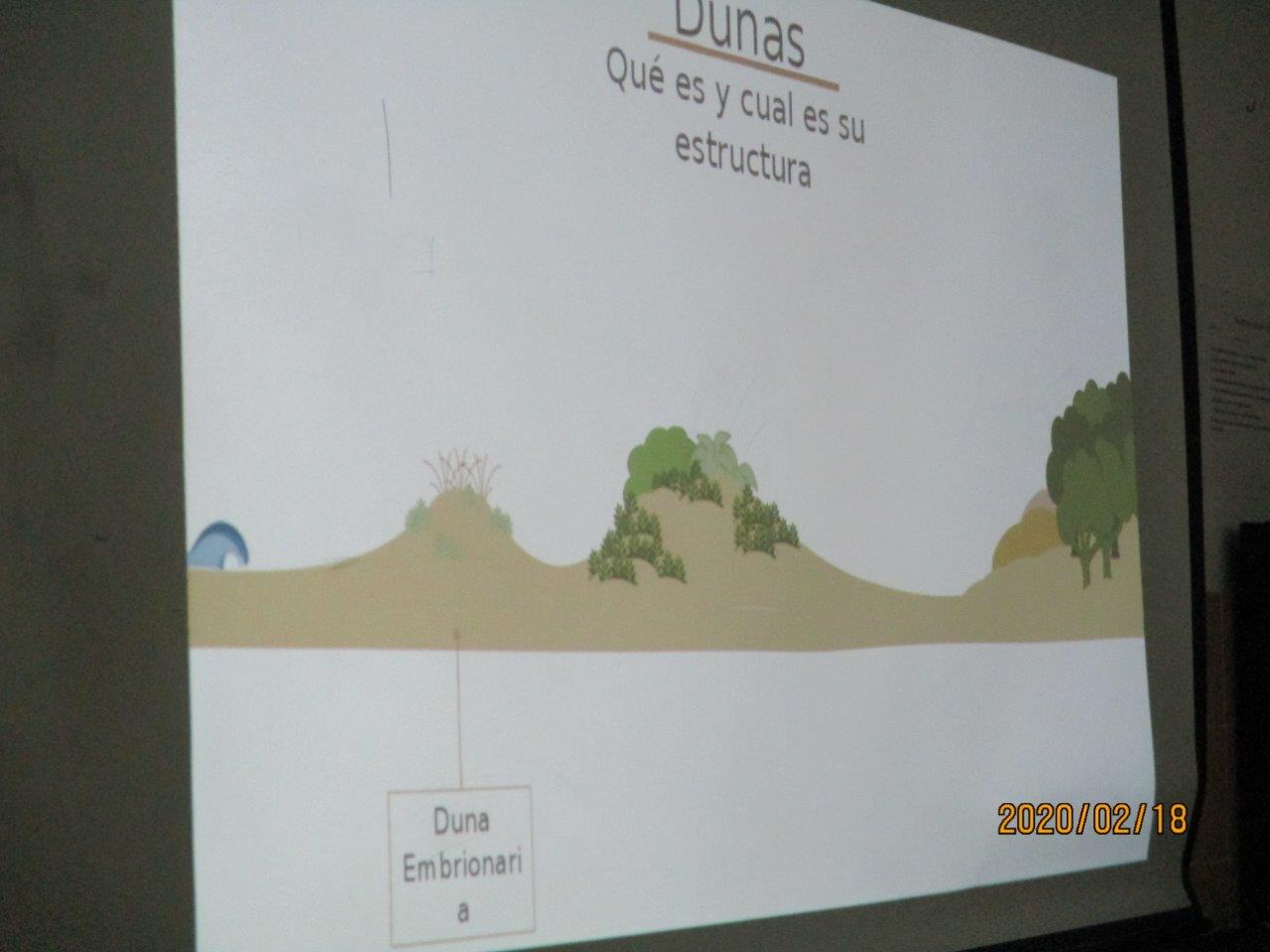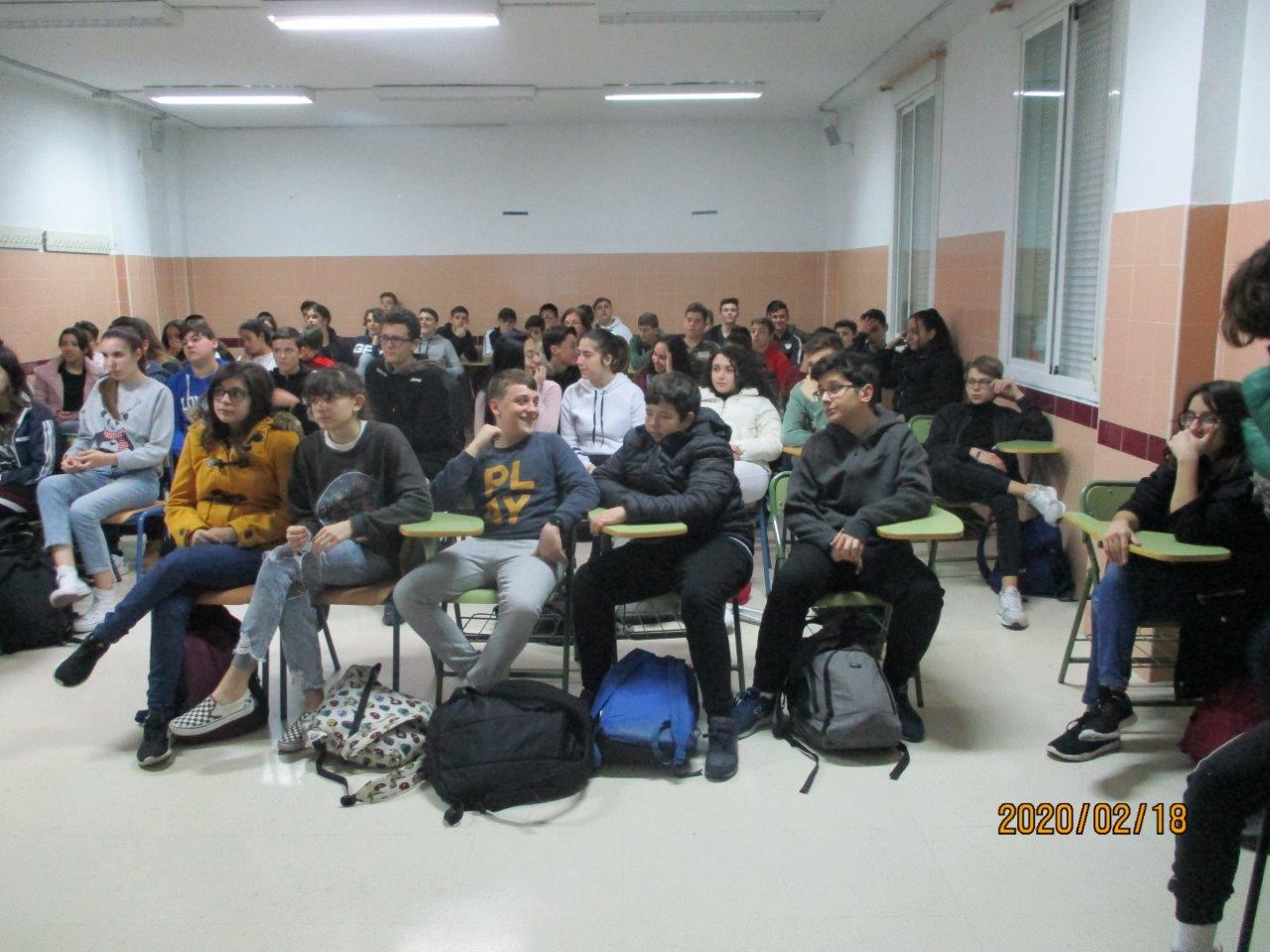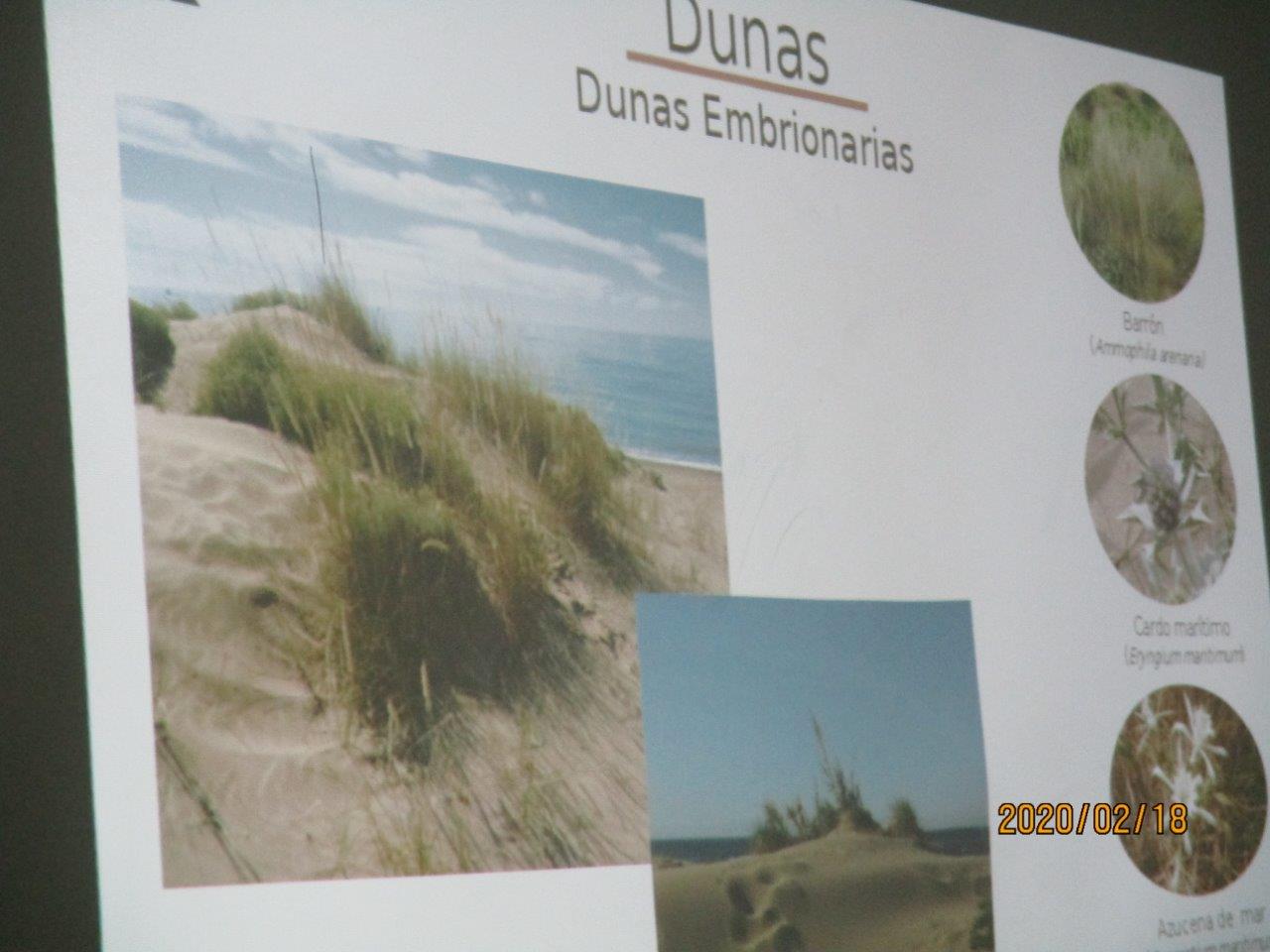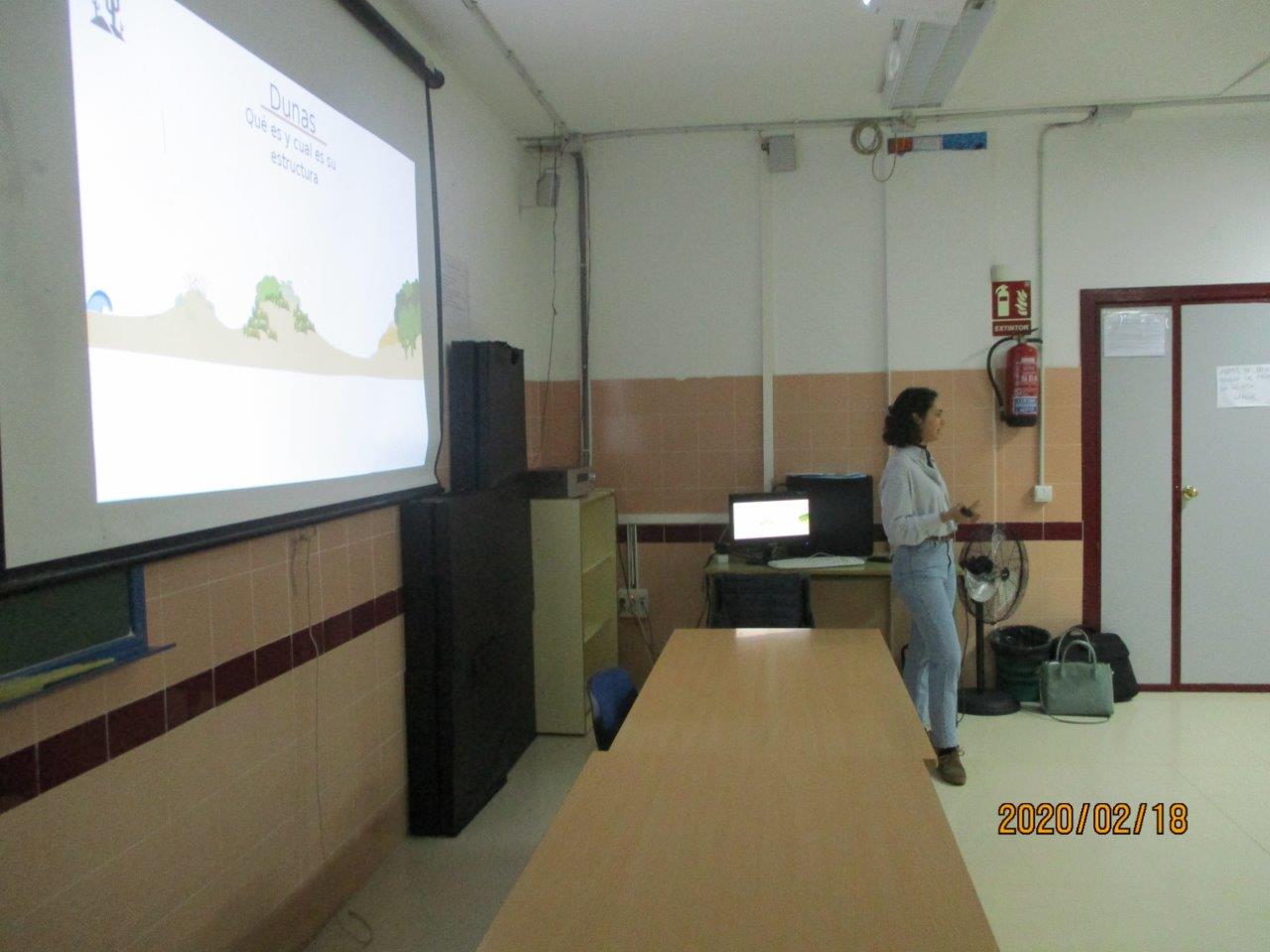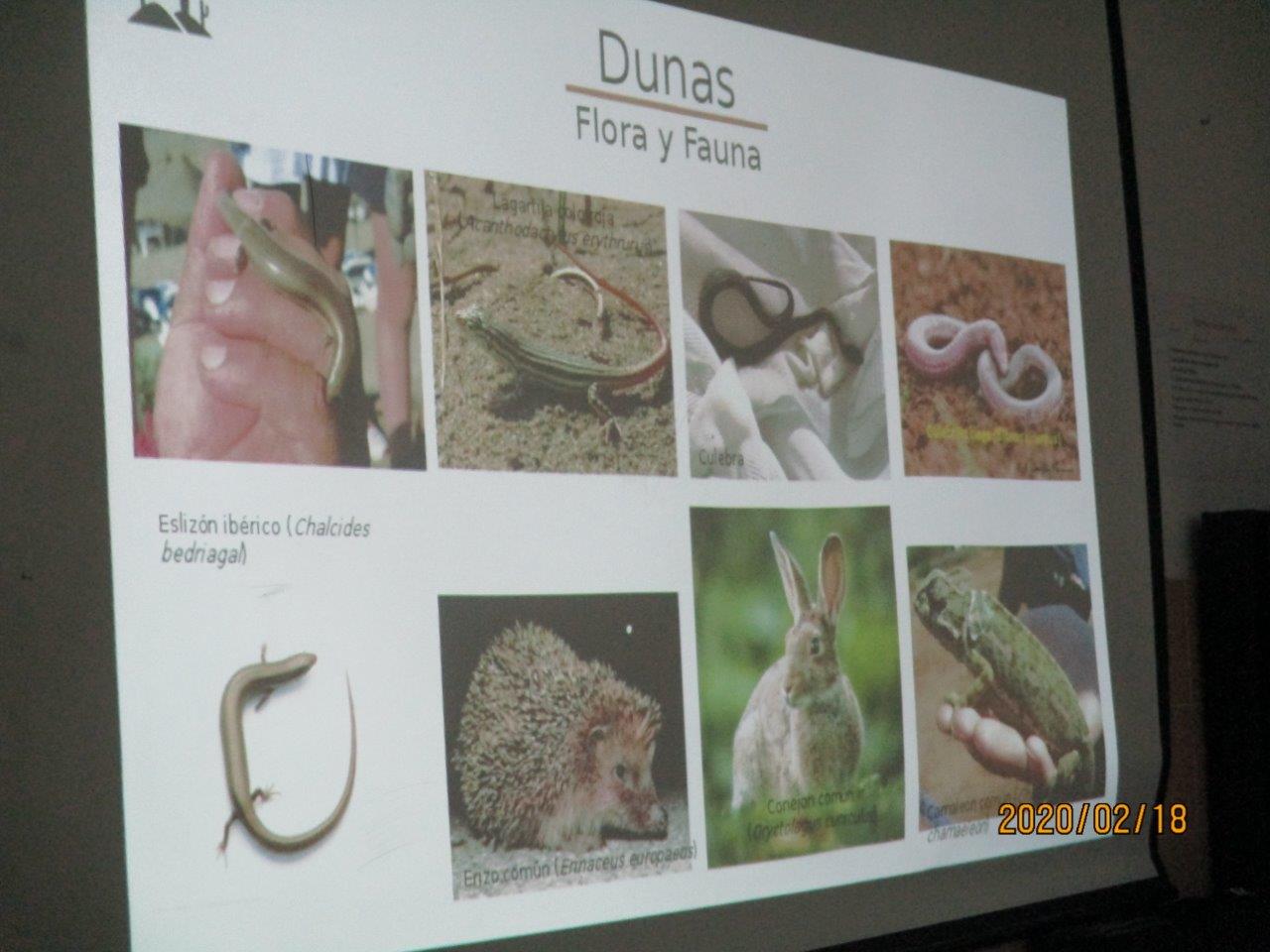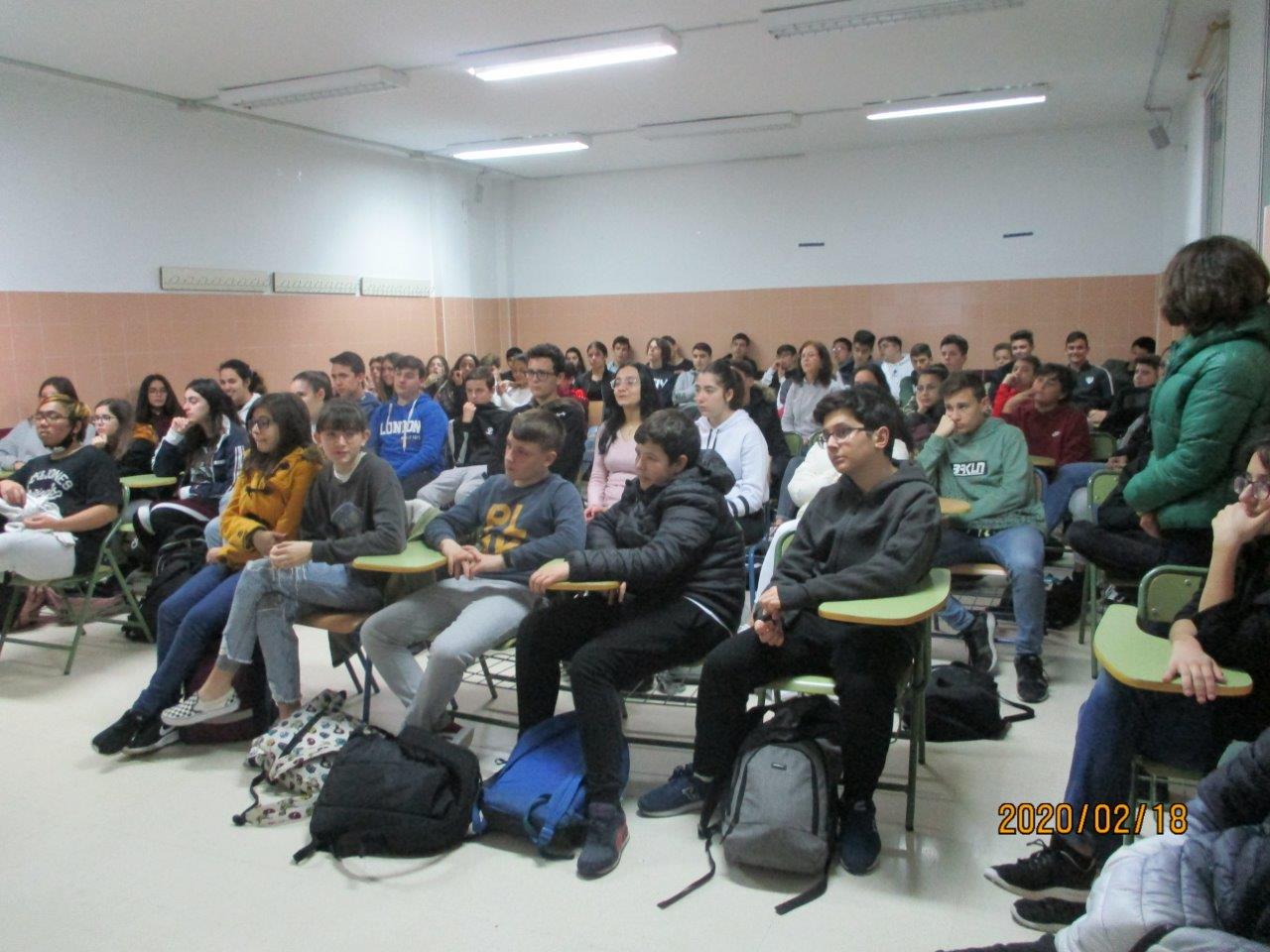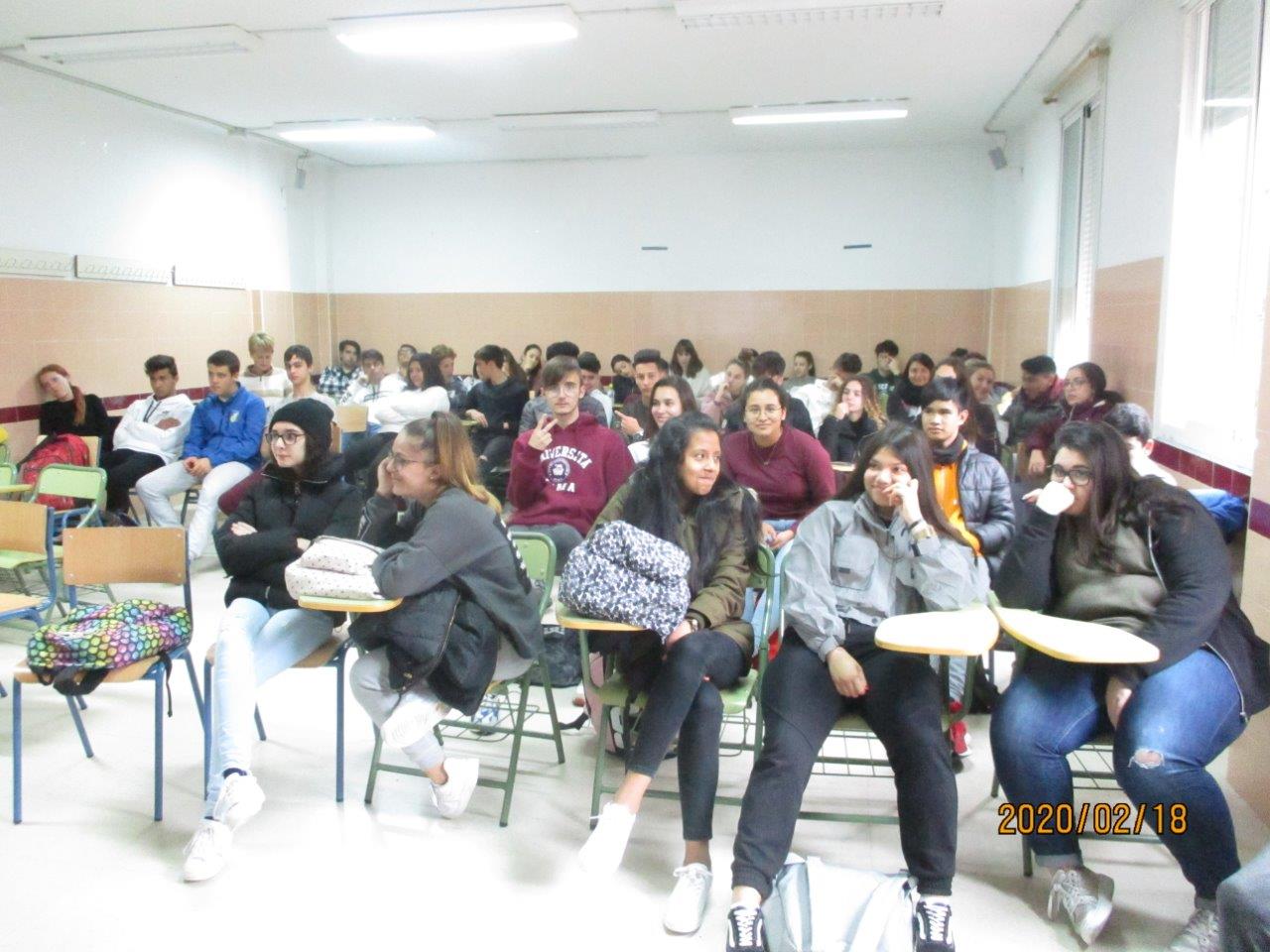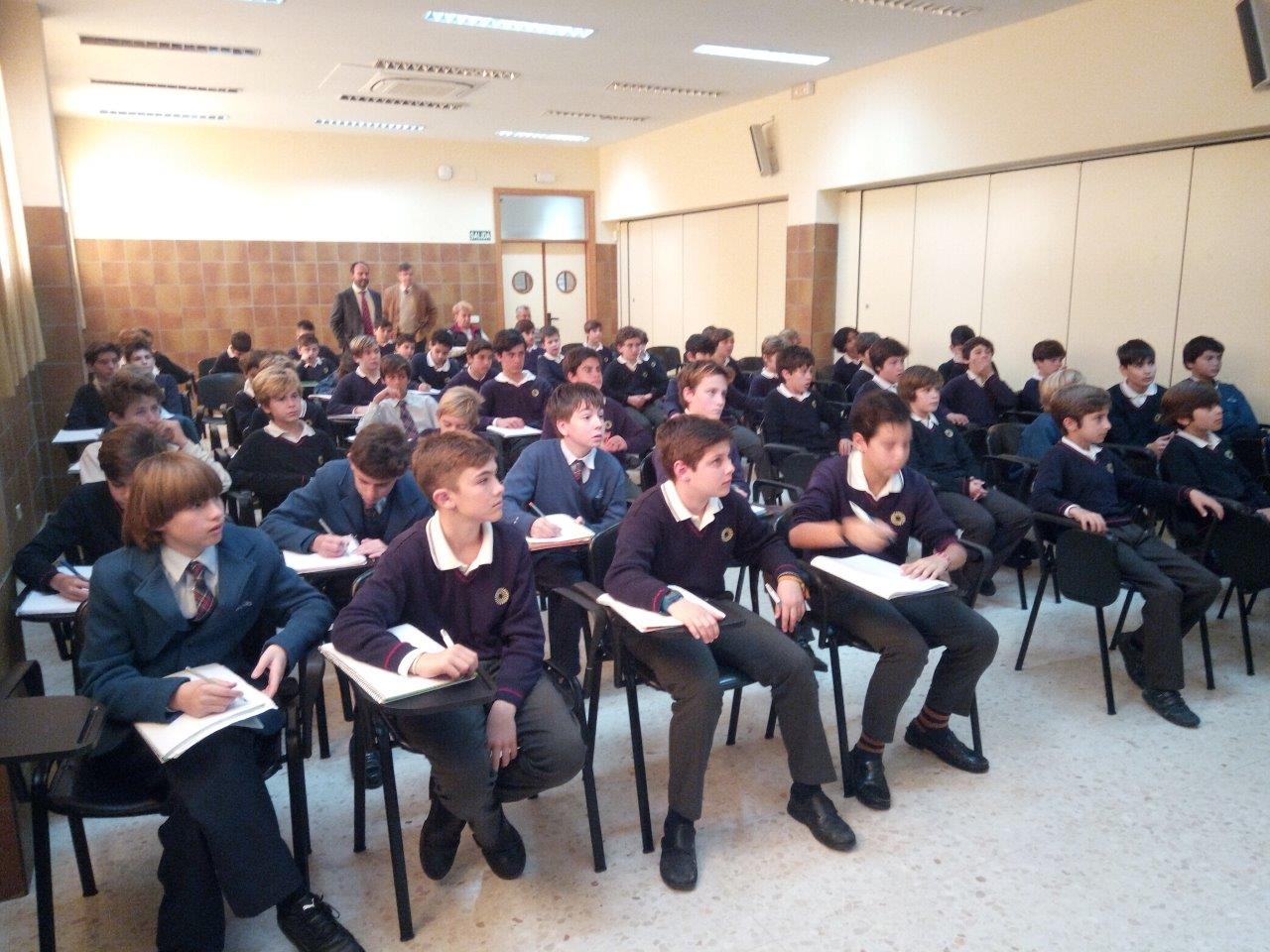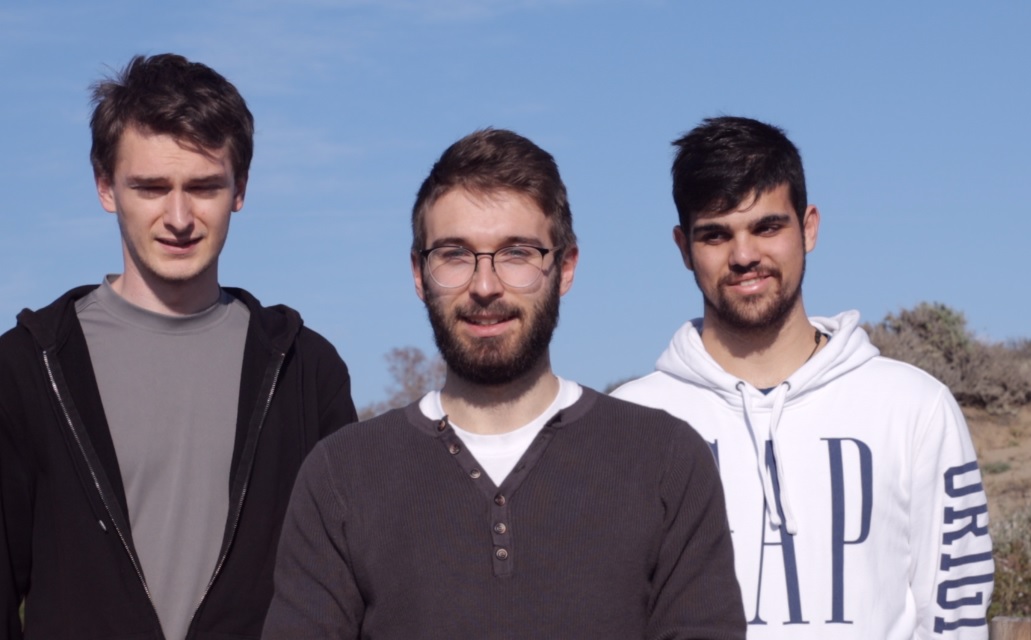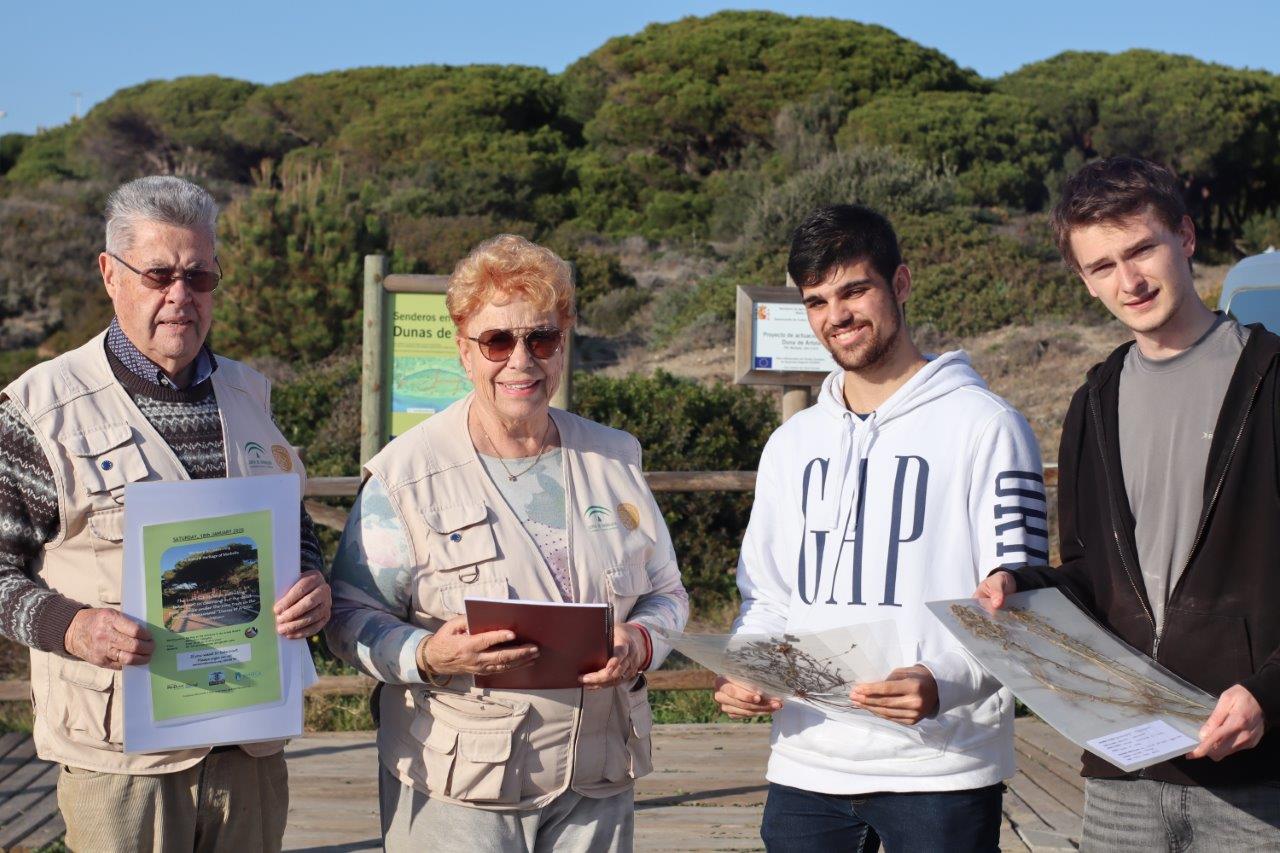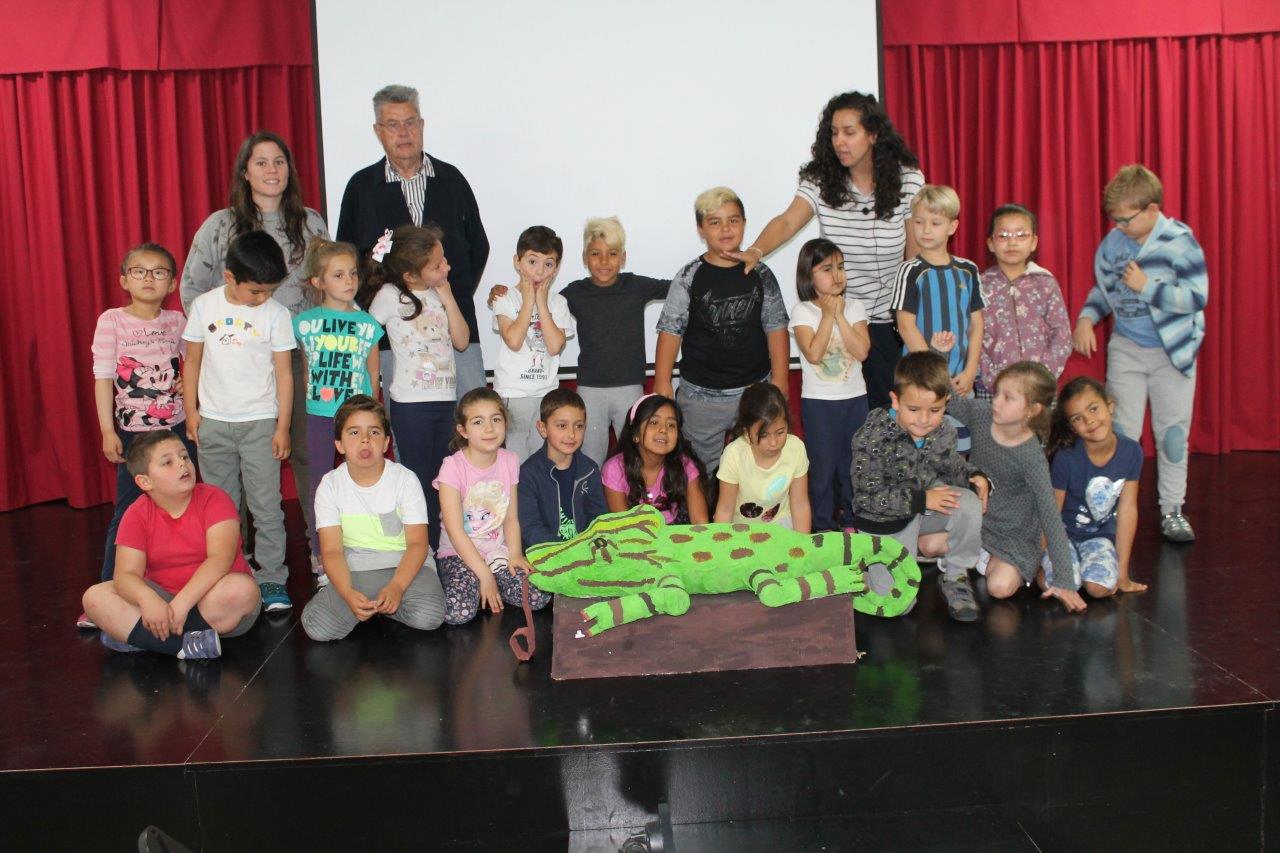Power Point Presentations
19.10.2023 – ProDunas Marbella Participates in Important Event at Atlas American School of Málaga High School NGO Fair
ProDunas Marbella was kindly invited to take part in a special event at the Atlas American School of Málaga. The invitation was extended with the purpose of including ProDunas Marbella in a presentation about our mission and the development of programs we conduct, held at the school. The event, titled “High School NGO Fair for Secondary School Students,” was organized to encourage and inspire students to generate ideas and/or collaborate in community service hours within our organization. It was recognized that ProDunas Marbella’s work was in complete alignment with the objectives of this event.
During the presentation, María Morán, a Biologist from ProDunas Marbella, played a pivotal role in explaining the daily activities carried out by ProDunas Marbella, as well as the challenges faced by the dunes that endanger ecosystem survival. This underscored the importance of continuously supporting our Association in its efforts.
This collaboration highlighted ProDunas Marbella’s commitment and work in environmental conservation, providing a valuable opportunity to educate and inspire young students about the importance of preserving the natural environment.
On October 10, 2023, ProDunas Marbella received a gracious invitation to participate in a special event at Atalaya International School in Estepona. The purpose behind this invitation was for ProDunas to join a presentation aimed at high school students aged 16 to 17 who needed to fulfill their community service hours.
This event, titled ‘THIS is CAS!’ (Creativity – Activity – Service), aimed to introduce International Baccalaureate students to the valuable work carried out by ProDunas Marbella. The goal was to encourage young individuals to collaborate with the Association in completing their volunteer hours and inspire them to create their own initiatives within the International Baccalaureate program. The primary purpose was to raise awareness among students and promote ProDunas Marbella’s initiatives, particularly regarding dune and marine conservation.
During the presentation, ProDunas Marbella’s Biologist, María Morán, shared information about the Association’s daily activities and highlighted the challenges faced by the dunes. These challenges endanger the survival of these invaluable ecosystems, emphasizing the critical need for continuous support for ProDunas Marbella to carry on its work.
A few days ago, our biologist Estefania visited Ecos School to give a PowerPoint presentation on the Environment in Marbella. The sixth grade students were fully engaged, paying a lot of almost unwavering attention, as they were at the beginning of their Unit of Inquiry on the Environment in the municipality of Marbella.
Habits acquired in childhood stay with us.
The Management of this International School is very clear about this fact.
They got in contact with us asking us to give a talk to their 3rd Grade Group, backing it up with a PowerPoint presentation.
We took Moby Dick as the title. We wanted to show what happens when a Cetaeans or Sea Turtles gets stranded on one of our beaches – what we should do and what should we not to do if we find a marine animal, either dead or alive. Our biologist María got “down to business” and in no time at all she had put created a beautiful, instructive video.
Now the schoolchildren are tasked with presenting their interpretation of the instructions to us in March. They have to show it to us to have us evaluate it to assess their level of understanding of what should be done in the case of a stranding and who to notify. This should always be FIRST: 112 with the exact location of the where the stranding has taken place, and then to ProDunas Marbella.
It has given us great satisfaction to see that both the teachers and the schoolchildren are increasingly getting involved in learning how to be useful to the natural world.
Thank you Atalaya International College!
October – November 2021 – THE PRODUNAS MARBELLA ASSOCIATION
HOSTED A GROUP OF STUDENTS IN THE ERASMUS PROGRAM
ProDunas Marbella has signed a Working Agreement with the Madrid Practivista Organisation so that European students can enjoy training sessions in the framework of the Erasmus + mobility programs of the European Union.
Working with ProDunas Marbella consists in improving the qualifications of 5 students on environmental matters through direct and practical information in various dune environments on the Marbella coast. They will study with our Volunteers, and be coached by the Association’s biologists.
When they arrived, we welcomed them to the training program with our video: “Without dunes, there are no beaches”. Then María Morán, our biologist gave a PowerPoint presentation in English on the history and work of ProDunas Marbella, to initiate them into the world and ecosystems of the dunes.
October – November 2021 – THE PRODUNAS MARBELLA ASSOCIATION
HOSTED A GROUP OF STUDENTS IN THE ERASMUS PROGRAM
ProDunas Marbella has signed a Working Agreement with the Madrid Practivista Organisation so that European students can enjoy training sessions in the framework of the Erasmus + mobility programs of the European Union.
Working with ProDunas Marbella consists in improving the qualifications of 5 students on environmental matters through direct and practical information in various dune environments on the Marbella coast. They will study with our Volunteers, and be coached by the Association’s biologists.
When they arrived, we welcomed them to the training program with our video: “Without dunes, there are no beaches”. Then María Morán, our biologist gave a PowerPoint presentation in English on the history and work of ProDunas Marbella, to initiate them into the world and ecosystems of the dunes.
17th and 21st February, 2020
IES DUNAS DE LAS CHAPAS Secondary School – Power Point Presentation to 110 students
The 2 introductory talks, backed up with a PowerPoint presentation, which we gave to the 2nd + 3rd Secondary School classes
prepared them to understand what they will be doing once they will go out to their sponsored dune.
18th February, 2020
BAHÍA DE MARBELLA Secondary School – Power Point Presentation to 115 students
Both classes of the school’s 3rd level were really interested.
We find that these presentations in class-time help awaken and develop students’ interest in the valuable natural heritage
of the Marbella dunes.
8th February, 2020
FORUM AT THE LIONS CLUB MÁLAGA GIBRALFARO
PROMOTING THE NATURAL HERITAGE OF THE DUNES IN MARBELLA
On Saturday we had the honour of being invited by the Lions Club of Málaga Gibralfaro to the XXXIII Lions Conference. We want to thank them for the opportunity they gave us to present ProDunas and the dunes of Marbella. We presented an audio-visual production in which we touched on various topics.
Firstly, we centered on ProDunas, describing its framework and highlighting its main objectives. We underlined the value of the dune ecosystems; we explained their great complexity and biological interest. Finally, we went on to highlight the future projects currently being developed. We emphasised the reliance we place on the participation by members of the public and, above all, on the schools and the schoolchildren. They actively help conserve this valuable Natural Heritage. They are the future.
We presented and explained in detail all about the proposal for the installation of multifunction artificial reefs in 3 of the dune areas. This is an innovative solution that ProDunas has been actively supporting since 2016. The reefs would reduce the destructive power and erosion of storms on the beaches and dunes of the Marbella coast.
Our presentation was well received and the audience applauded warmly. This motivates us to fight, day by day, for the fragile legacy of the ecosystems of the Costa del Sol.
4 de febrero de 2020
Ceip Vicente Aleixandre de Marbella
Este Centro escolar lo ha hecho perfectamente! Ha solicitado a ProDunas charlas en el Centro escolar apoyándose éstas con una presentación mediante PowerPoint, para que los jóvenes alumnos puedan entender en clase, lo que van a hacer en campo dunar.
La interacción de preguntas y respuestas impulsa el interés de todos.
17th January, 2020
ECOS-Attendis Marbella
16th January, 2020
ENVIRONMENTAL SCIENCES STUDENTS OF THE UNIVERSITY OF MÁLAGA
May 2018 – CEIP VICENTE ALEIXANDRE
IT WAS WONDERFUL TO SEE THE EXCITEMENT shown by the schoolchildren of the Primary School Vicente Aleixandre, when we put on a video and showed photos of the Common Chameleon in their school. The questions came thick and fast and like sponges they absorbed the information given by our colleague and friend Patricia, biologist and doctoral student who is doing her thesis on the Common Chameleon. The teachers were very disappointed not to see a real, live Chameleon.
The Common Chameleon is not a pet. We have to respect the fact that it lives in freedom in sandy areas such as the dunes of the Artola Natural Monument.
April 2018 – CEIP RAFAEL FERNÁNDEZ MAYORALAS
The Primary School children were enthusiastic about the toy Common Chameleon that our co-worker Patricia had made to better explain everything about this beautiful reptile. The Chameleon is totally protected by law.
The following explanation is valid for everyone:
The Ministry of Environment of the Junta de Andalucía does not allow us to remove any Common Chameleon (Chamaeleo chamaeleon) from its habitat, not even to use it for didactic purposes in a school.
The Common Chameleon is not a pet. We have to respect the fact that it lives in freedom in sandy areas such as the dunes of the Artola Natural Monument.
January 2018 – Environmental Education in schools – Presentation of the Common Chameleon (Chamaeleo chamaeleon)
COMMITMENT TO AND PROTECTION OF THE CHAMELEON IN THE DUNAR ECOSYSTEMS
NTRODUCTION OF CHAMELEON INTO THE DUNAR AREAS AND THE REASONS FOR IT
In July 2016 the Regional Ministry of the Environment and Territorial Planning supported the initiative of the Pro Dunas Association to introduce the Common Chameleon (Chamaeleo chamaeleon) into the dune areas of Marbella. Those of the older generation in the town know that there were always chameleons around where there was enough native vegetation. With the introduction of 5 specimens – 2 males and 3 females – it was intended that during the breeding season (in July and August) the survival of the species here could be guaranteed. This and other actions planned for the near future to increase the number of chameleons are aimed at protecting this beautiful reptile and facilitating its natural expansion.
The reintroductions must be carried out in areas where they existed previously. Before the reintroduction, the area, the habitat and the possible threats were analysed to optimise their chances of survival. Returning the chameleons to their natural habitat means a lot of hard work for the females during the egg-laying period because they have to excavate the galleries they live in , which can be about 5 to 30cm underground. If the females are in perfect physical condition they can lay two sets of eggs per year.
The re-introduction in pairs raises the number of meeting between the females and males and thus favours the number of viable eggs laid with the subsequent annual additions of juveniles.
The habitats of the reintroduction zone should harbour woody shrub plant species such as Stone Pines (Pinus pinea), Brooms (Retama monosperma blanca), Wild Olives (Olea europaea silv.), Mastics (Pistacia lentiscus), Fan Palms (Chamaerops humílis), Junipers (Juníperus phoenicea subsp. turbonata), Kermes Oaks (Quercus coccifera) etc.etc.
DESCRIPTION OF THE CHAMAELEONIDAE FAMILY
The common chameleon is a typical species of the Mediterranean climate. The smallest can measure between 2.9 and 30 centimetres. The common chameleon is adapted to living in shrubs. It has prehensile fingers for climbing trees and branches. The tail is always rolled up. Their eyes have a membranous turret-like structure that allows them to move each one in a different direction and at an angle of practically 360°, depending on what they want to see. Although they do not have external ears they can detect vibrations and low frequency sounds of about 200Hz. They move extremely slowly and the tongue can shoot out like a projectile when they are hunting. This is long, sticky and retractable and can trap its prey from quite a distance. Their favourite food is live insects: crickets, grasshoppers, silk worms, etc. The most striking biological aspect is the ability to change colour, its famous camouflage strategy or depending the emotional moments.
Do you want to receive our Newsletter?
Do you want to become a member or be our friend of the dunes?
Asociación ProDunas Marbella
La Asociación trabaja incesantemente en defensa y preservación de los singulares ecosistemas aún existentes en los entornos naturales con dunas en la Provincia de Málaga; impulsa la protección de su flora autóctona y pequeña fauna silvestre; fomenta la recuperación, rehabilitación y conservación de la interesante biodiversidad en las zonas dunares del municipio de Marbella.
+34 609 600 706
comunicacion@produnas.org
